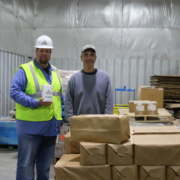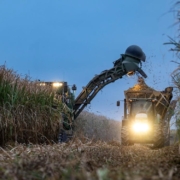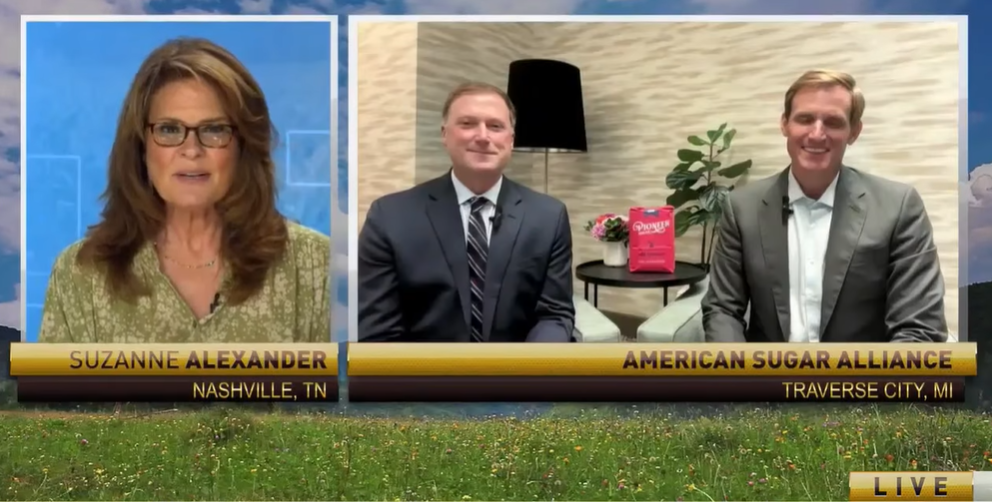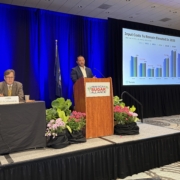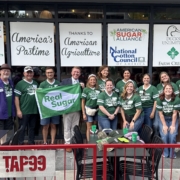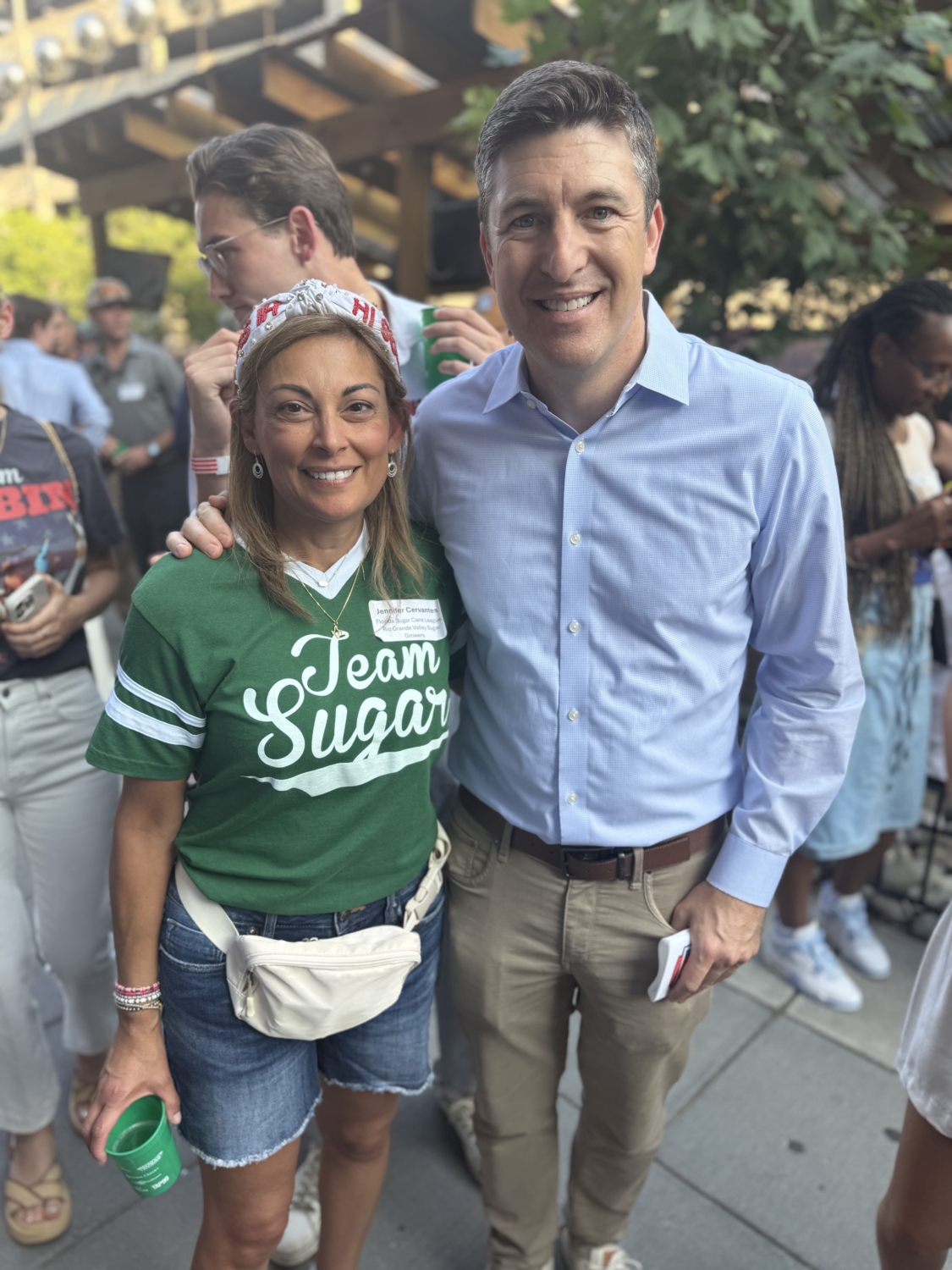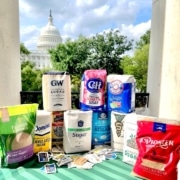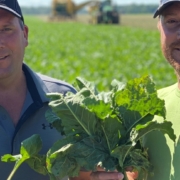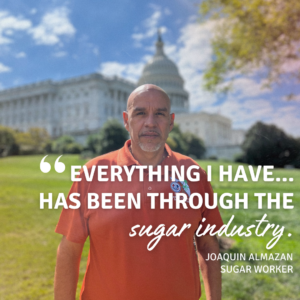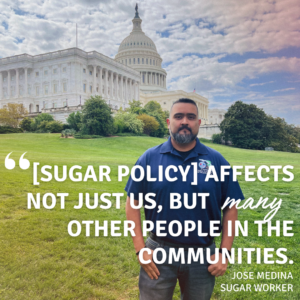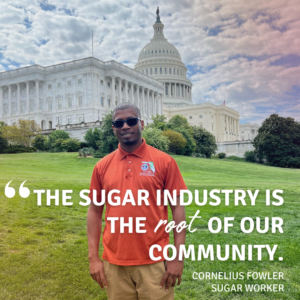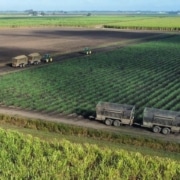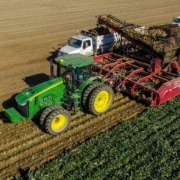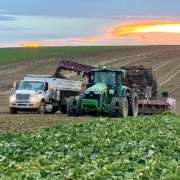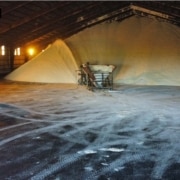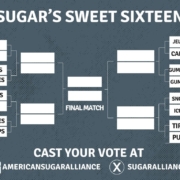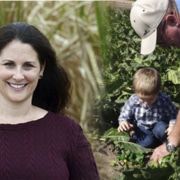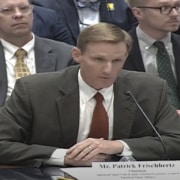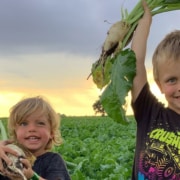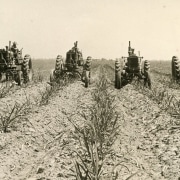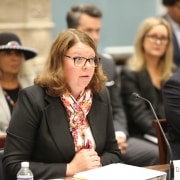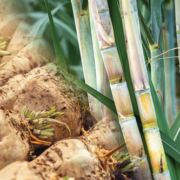American Sugar Alliance Congratulates Julie Callahan on Confirmation as Chief Agricultural Negotiator
On behalf of the nation’s sugarbeet and sugarcane farmers and workers, the American Sugar Alliance issued the following statement on Julie Callahan’s confirmation as Chief Agricultural Negotiator in the Office of the United States Trade Representative:
“We congratulate Julie Callahan on her confirmation and look forward to working with her to put American farmers first and strengthen guardrails that protect our growers from unfair trade practices. Callahan’s experience at USTR and the FDA demonstrates a deep understanding of the importance of maintaining strong domestic food production, and she will no doubt draw on that expertise as she takes on this important responsibility.
“As the nation’s Chief Agricultural Negotiator, Callahan will play a vital role in upholding fair trade practices. The global sugar market is dominated by heavily subsidized producers that dump their surplus on the world market. Strong U.S. leadership and sound trade policy are essential to ensuring a level playing field for our producers.”
America’s sugar producers are proud to support more than 151,000 jobs coast to coast, drive $23.3 billion in annual economic impact, and provide a steady, affordable supply of made-in-America sugar, while meeting some of the highest environmental, labor, and food quality standards. American sugarbeet and sugarcane farmers supply approximately 75% of the sugar consumed nationwide.
Giving Back Sure is Sweet!
Across the nation, Thanksgiving brings us together around the table and in our communities. America’s sugarbeet and sugarcane growers share in that spirit of connection, adding sweetness to our celebrations and strength to our communities. Their work reminds us that giving back takes many forms, and all of them make life a little sweeter.
Michigan Sugar Company
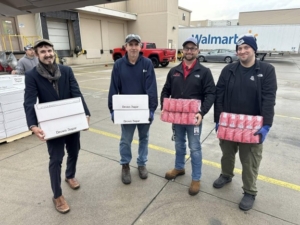
Michigan Sugar Company members volunteer at their annual United Way Sugar Distribution Day.
Michigan Sugar Company celebrated National Real Sugar Day in a big way! Team members came together to volunteer at the company’s annual United Way Sugar Distribution Day, donating over 57,000 pounds of REAL Pioneer Sugar to more than 100 nonprofits, many of them food pantries, across multiple counties.
We’re proud of Michigan Sugar Company for stepping up in such an impactful way for families and neighbors in need.
Domino Sugar
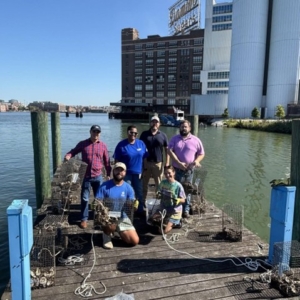
Domino Sugar Refinery employees lowering 50 cages of baby oysters into the bay.
The Domino Sugar refinery is located right in the heart of Baltimore on the Patapsco River. Oysters act as a natural filtration system and keep the water clean for other living creatures. With oyster populations in severe decline, the Chesapeake Bay Foundation launched an Oyster Gardening Program, with Domino Sugar proudly taking part.
Every fall, Domino Sugar employees lower cages of baby oysters into the river to begin their growth. Throughout the season, volunteers regularly clean and care for the oysters before they are released into a sanctuary reef in the Chesapeake Bay. Every year, Domino Sugar helps raise more than 100,000 oysters, contributing to the health of the river and the restoration of this ecosystem, and this year’s process is off to a great start.
American Crystal Sugar Company
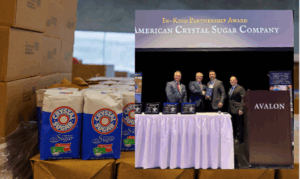
Ryan Wall, Vice President-Administration at American Crystal Sugar Company, accepting an award at the local Scouting America council’s Hometown Heroes Gala in honor of American Crystal’s contributions to the local community, and bags of Crystal Sugar ready to pack into meal boxes for those in need.
American Crystal Sugar Company has made a commitment to give 5 cents for every ton of sugarbeets harvested to local charities in the communities where its employees live and work. At part of that commitment, American Crystal shares the sweet gift of sugar, donating tens of thousands of pounds of its namesake Crystal Sugar across the Red River Valley of Minnesota and North Dakota.
That means more than 6,000 families in the Red River Valley will have sugar in their holiday meal boxes this holiday season.
In October, American Crystal Sugar Company was recognized for this work with the In-Kind Partner Award from the local Scouting America council.
U.S. Sugar

Students with their new backpacks provided by U.S. Sugar.
U.S. Sugar knows that strong classrooms mean strong communities. At the start of the school year, U.S. Sugar donated 120 backpacks filled with school supplies to help local students head off to school prepared for the year ahead!
Western Sugar Cooperative
More than 700 farmers across 4 states grow sugarbeets for Western Sugar Cooperative. This year, Western Sugar was a key sponsor for Bayard Public Schools in Nebraska, helping fund school activities and programs for a school system serving many of its grower-owners in the state. This sponsorship helped ensure students have access to enriching opportunities both inside and outside the classroom and furthered Western Sugar’s support for local education, youth development, and community engagement.
Louisiana Sugar Refining
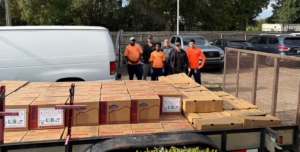
Boxes filled with a turkey, a 4-pound bag of sugar, green beans, mac and cheese, and other Thanksgiving dinner essentials ready to be distributed.
The Louisiana Sugar Refining (LSR) refinery in Gramercy, Louisiana, is a cornerstone of its local community. LSR and its contractors worked together to provide local families with a Thanksgiving meal through their annual Thanksgiving Basket Drive. The boxes, which included a turkey, will ensure that several families who may normally have to do without will have a full table and a warm meal to celebrate the season.
Minn-Dak Farmers Cooperative
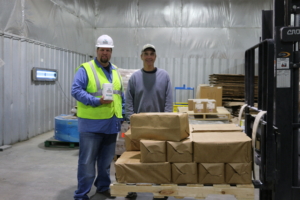
A Minn-Dak sugar donation being delivered to a food pantry in Wahpeton, North Dakota.
Every year, Minn-Dak Farmers Cooperative donates sugar to several food pantries in the surrounding region, including food pantries in Wahpeton, North Dakota, and the towns of Fegus Falls, Hoffman, and Elbow Lake in Minnesota. To date in 2025, Minn-Dak has donated more than 5,500 pounds of sugar to food pantries, providing neighbors in need with an essential ingredient – grown and processed right there in the Red River Valley. The grower-owned cooperative also donates sugar packets to area churches, sweetening coffee and strengthening its bonds with the local community.
The sugar community’s reach is far and wide. This Thanksgiving season, we’re grateful for our sugarbeet and sugarcane growers, and our partners who work so hard and find time to give back to their communities.
This year, as you gather with family and loved ones, hopefully eating a sweet piece (or two!) of pie, remember to thank America’s sugarbeet and sugarcane growers for their hard work.
Here’s to gratitude, good company, and another very sweet Thanksgiving.
Farmers’ Share of Halloween Treats is So Small, It’s Frightful 😱
Trick-or-treat: it’s time to stock up on something sweet!
Americans are forecast to spend $3.9 billion on candy this Halloween, according to the National Retail Federation. That’s up from $3.6 billion last year and $3.1 billion in 2023.
There’s no doubt: Halloween is sweet.
Yet, you might face a fright as you purchase candy for the goblins and ghouls who haunt your door. The price you pay for candy has increased – while the already small amount our farmers receive for the sugar in that candy has decreased.
We looked at the prices for some Halloween-ready bags of multiple trick-or-treat portions and compared them to the same items from our last Halloween survey in 2023.*
In true Halloween horror, the retail price of the items we surveyed increased an average of 19%. But, the cost of sugar in each item decreased an average of 33%. As Dr. Rob Johansson, Director of Economics and Policy Analysis at the American Sugar Alliance, wrote in the Wall Street Journal: This is a markup problem.
The cost of planting, cultivating, harvesting, and processing the sugarbeets and sugarcane that become the real sugar in your favorite Halloween treats has skyrocketed and the prices American sugar producers receive for their sugar has decreased. In just the past two years, prices for beet sugar and cane sugar have fallen by 42% and 24%, respectively.
For example, a bag containing 22 individual fun-sized packages of chocolate candies that was priced at $5.99 in 2023 is now priced at $6.99 in 2025. Yet, the cost of the sugar required to make that bag of candy has decreased from $0.25 in 2023 to $0.16 in 2025. The sugarbeet or sugarcane farmer who grew that crop will receive even less.
Check out these spooky stats.
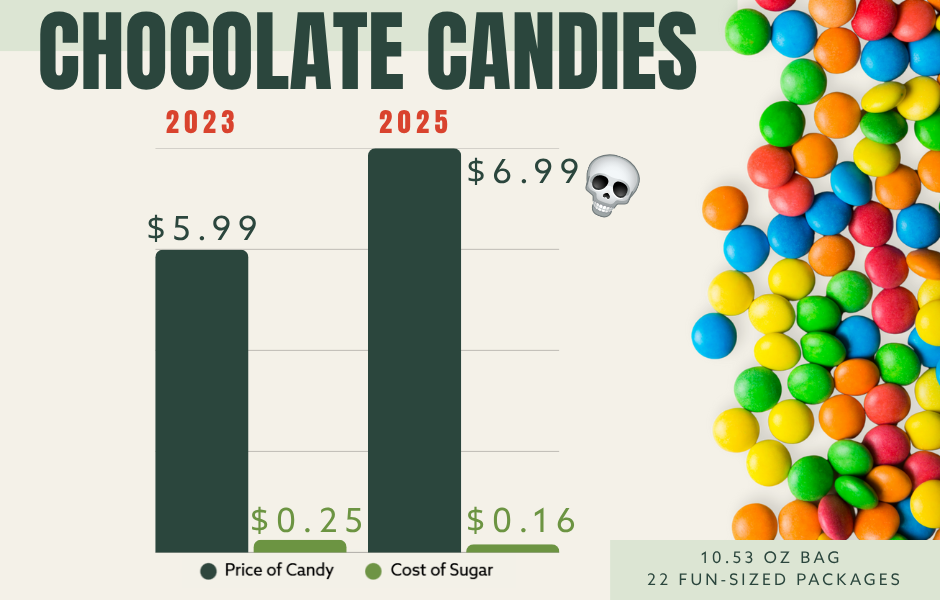
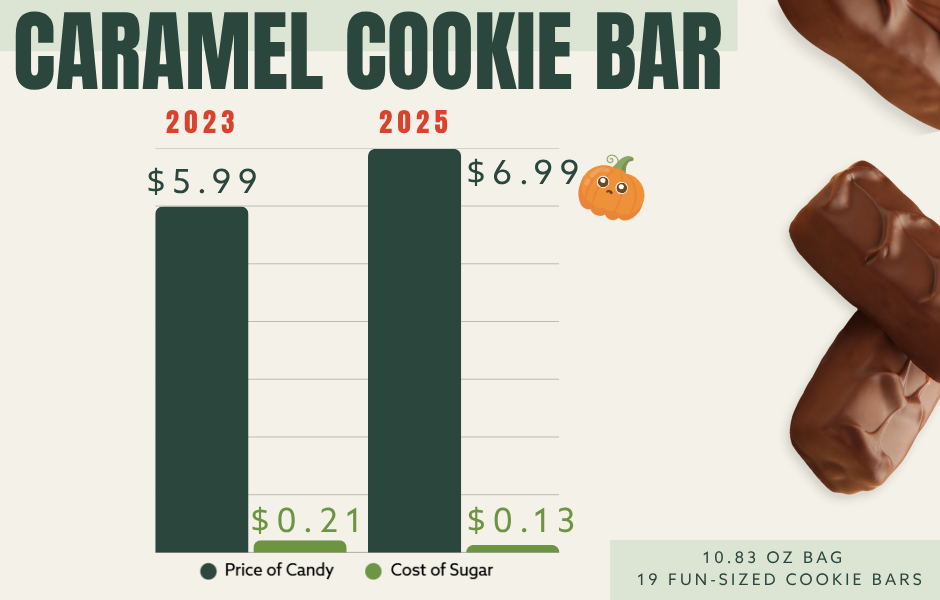
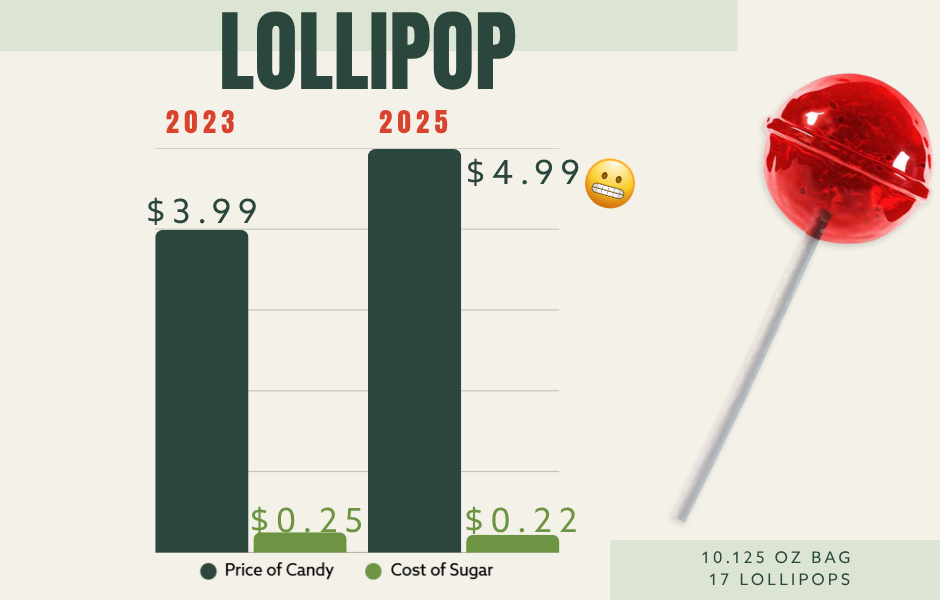
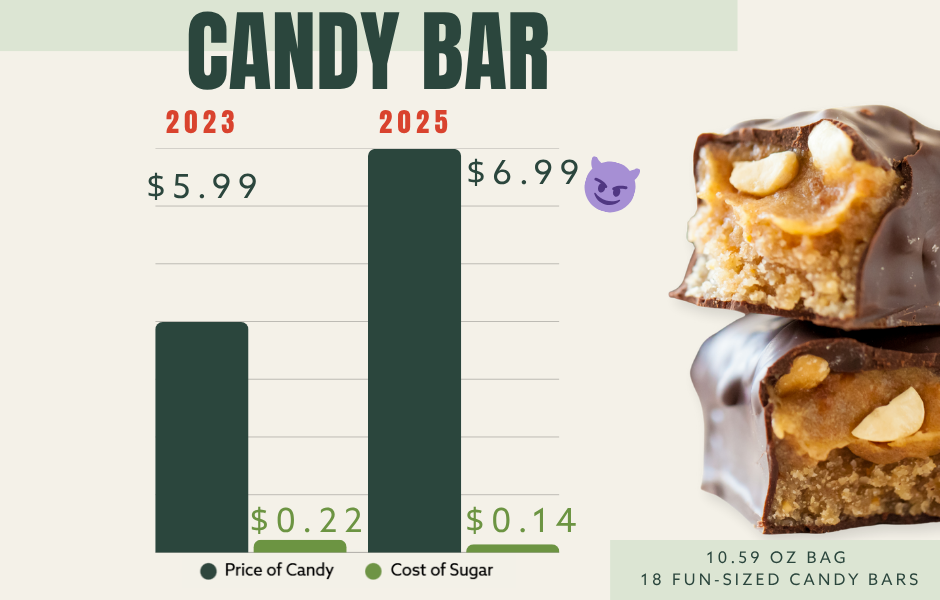
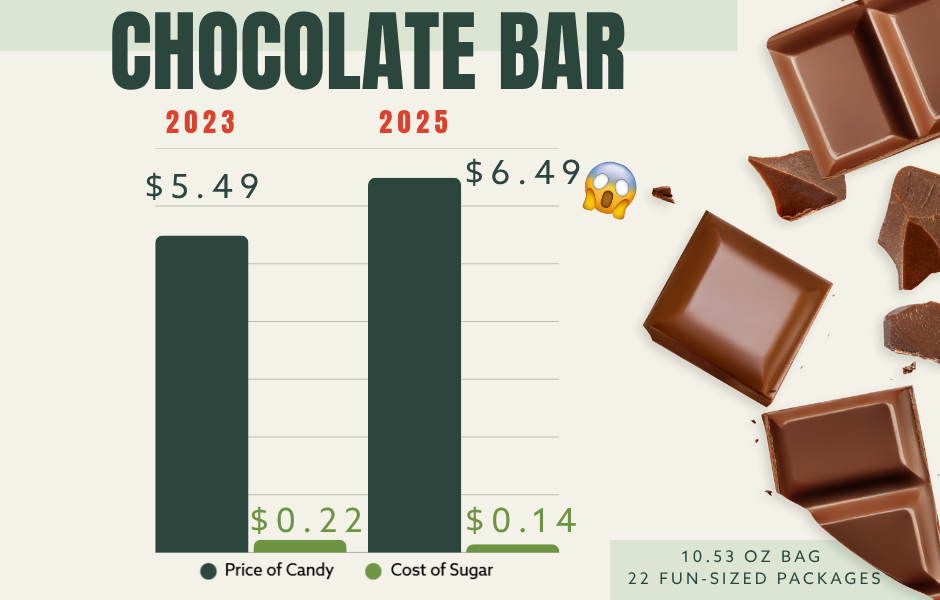
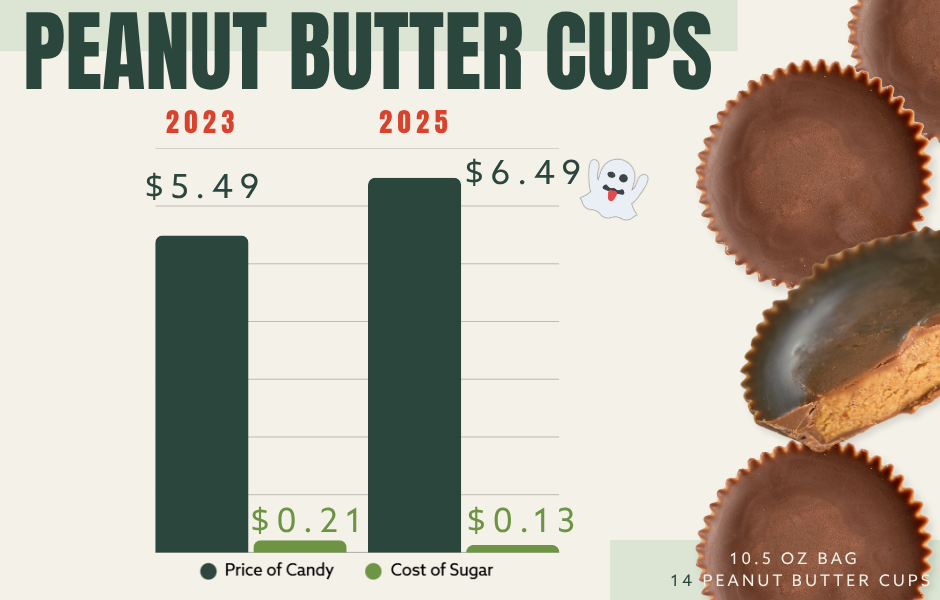
Thank you to the sugarbeet and sugarcane farmers who are still hard at work in the fields harvesting and the workers who extract the sugar that makes our Halloween treats so sweet.
*All candies were surveyed at the same grocery store in the Washington, DC, area and are identical in size to the items surveyed in 2023.
Sugar 101: It’s Harvest Time!
Welcome to harvest season! Sugarbeets and sugarcane are harvested in different ways, but both become the real sugar on your table. It’s all thanks to the family farmers and workers whose work sustains rural communities and keeps America sweet. Here is a glimpse into how they do it.
Sugarbeet Harvest
By late August, the seeds our farmers planted in the spring have grown into sturdy roots, ready to be pulled from the ground.
The first step is to defoliate the sugarbeet by removing their leafy tops. The leaves of the beet act as natural insulation, so the timing of this step can change depending on weather or harvest conditions. Next comes a harvester, which lifts the beets out of the ground and shakes off excess dirt.
Instead of using two tractors pulling a defoliator and a harvester, some farmers use a self-propelled harvester that combines both steps into one.
The sugarbeets are loaded into the bed of a semitruck or a beet cart right there in the field to be taken to a receiving station or factory, where the beets are stacked into towering outdoor piles and Mother Nature acts as natural refrigeration. The beets will stay in storage until they move through the factory, so these piles must be carefully managed to minimize spoiling.
Finally, the sugarbeets make their way to the factory, where they’re sliced and the sugar is extracted and crystalized.
Quick Facts About Sugarbeet Harvest
- Farmers need to harvest their beets before it gets too cold, or the sugarbeets will freeze in the ground.
- In the Red River Valley spanning Minnesota, North Dakota, and South Dakota, harvest runs for 24 hours a day, 7 days a week if conditions are right. Can you imagine having to fix a broken sugarbeet harvester at 3 AM? This is reality for many farmers!
- Factories will also run 24 hours a day, 7 days a week until the spring to process the sugarbeets into refined sugar. This is called a campaign.
- No part of the sugarbeet goes to waste! Beet pulp pellets and shreds are used in a variety of ways; it is a premium food source for animals like show horses, or in the pet food you might find at your local pet store. Beet juice is also used in deicing mixtures to help clear roads and runways.
Sugarcane Harvest
Sugarcane is unique in that it is planted in the fall, and it will grow for a full year before it’s ready to harvest. That means planting and harvesting overlap. Harvesting begins in mid-September and goes through mid-January in Louisiana and into May in Florida. Some sugarcane operations also harvest 24/7 – our farmers work hard until the job is done!
Rotating scrolls, or the crop dividers, on the sugarcane harvesters feed the cane into the harvester, where the cane stalks are chopped into smaller pieces and the excess leafy material is blown back onto the field. The cut cane is put into a cart which drives alongside the harvester, and which will eventually dump the cane into a semitruck or train car to take to the mill. New shoots will sprout from the sugarcane stubble left in the ground for the next few harvests, which is why all of the sugarcane on a farm doesn’t need to be planted annually.
From there, the sugarcane is transported to a nearby raw sugar mill to extract the sugar from the cane. Finally, the raw sugar is transported to a refinery to finish processing and packaging.
Quick Facts About Sugarcane Harvest
- Unlike sugarbeets, which can be stored for months, sugarcane must be processed into raw sugar as quickly as possible after harvest to preserve sugar content and prevent spoilage.
- Bagasse, the fibrous material that’s left over after the sugar juice is squeezed out of sugarcane stalks, fuels the boilers in the mills, producing steam and bioelectricity to power operations.
- Florida sugarcane producer U.S. Sugar owns one of largest privately-owned WiFi networks in the world. It covers 270 square miles and allows its tractors to navigate with sub-inch precision.
- Louisiana is the northern-most location in the world where sugarcane is grown.
As you can see, sugarbeet and sugarcane harvest require immense amounts of specialized equipment and skilled labor. Harvest always comes with challenges – like unpredictable weather or equipment failures. But this year, some farmers are facing yet another challenge: they may not even break even on their crop.
In just the past two years, prices for beet sugar and cane sugar have fallen by 42% and 22%, respectively. This dramatic fall in prices coupled with persistently high input costs – up more than 30% since the 2018 – are unsustainable.
We are thankful for the dedication of America’s sugarbeet and sugarcane farmers as they bring in the crops that keep it sweet in America.
Michigan Farmer: Family Legacies, Food Security Depend on Congressional Support
Rita Herford, a fifth-generation farmer and sugarbeet grower in Michigan, recently addressed the growing challenges facing farmers in The Detroit News.
“From soaring input prices to unpredictable weather to unfair foreign trade practices, farming is in many ways tougher than ever. While we’re no strangers to hard work or tough seasons, even the most resilient farm families need a fair shot.”
Rita has been growing sugarbeets her entire life and one day hopes to pass the family legacy and family farm to her children. With the farm economy facing new pressures, ensuring the next generation can take up the plow has become much harder for many family farmers.
“Farming runs deep in my family’s blood,” Rita wrote. “My children are now at the age where they can come along with us in the field to learn the responsibilities that come with growing our nation’s food.”
Yet, “I’ve seen how much harder [passing down family farms] has become.”
The immense financial pressures and predatory international trade practices threatening American family farms and factories were a key focus at the sugar industry’s annual meeting in Michigan. While sugar production in Michigan remains strong, several sugar processing facilities have closed in recent years as the cost of doing business has increased while sugar prices have decreased.
“We cannot take our food security for granted. As farmers, we must shine a spotlight on how hard it has become to sustain our operations in light of these financial pressures and the ongoing threat posed by foreign subsidies.”
These worries now hang over family farmers gearing up for harvest and sugar workers beginning their sugar campaigns. As another sugarbeet farmer told the Senate earlier this year, we’re proud to produce sugar in America, but “pride does not pay the bills.”
We are grateful for the dedication and grit of farmers like Rita and the continued bipartisan support for America’s sugarbeet and sugarcane farmers and workers. That support is critical to defending an essential American industry. Family farming legacies and our national food security count on strong farm and trade policies.
“The American sugar industry supports more than 151,000 jobs across the country. In Michigan, every year we grow more than 4.5 million tons of sugarbeets across 140,000 acres. This is a real engine of growth for our rural communities, and we want to keep it running.”
Read Rita’s full op-ed in The Detroit News here.
U.S. Continues Suspension Agreements on Mexican Sugar
The U.S. International Trade Commission (USITC) unanimously voted yesterday to maintain the Suspension Agreements on sugar imported from Mexico. This concludes a legal and procedural process required to be undertaken by the USITC and the Department of Commerce every five years to ensure the Suspension Agreements remain effective and are working as intended.
“Sugar is an essential ingredient for American consumers and food manufacturers, and our farmers and workers are proud to produce sugar here in the United States. However, predatory international trade practices threaten our family farms and American factories, and the USITC’s decision to continue the Suspension Agreements reflects that reality. Without these Suspension Agreements in place, the USITC found it likely that American farmers and workers would once again experience material injury due to dumped and subsidized Mexican sugar,” said Dr. Rob Johansson, Director of Economics and Policy Analysis at the American Sugar Alliance.
The United States maintains antidumping (AD) and countervailing duty (CVD) laws to defend domestic industries from injury by dumped and subsidized imports. In 2014, the U.S. International Trade Commission ruled unanimously that imports of dumped and subsidized sugar from Mexico materially injured the U.S. sugar industry. The resulting duties levied on Mexican sugar exports to the U.S. to prevent damage to American sugarbeet and sugarcane farmers were suspended by the AD/CVD Suspension Agreements with Mexico. Those agreements between the U.S. and Mexican government and the Mexican industry were signed in 2014 and strengthened by the first Trump Administration in 2017.
“On behalf of the 11,000 sugarcane and sugarbeet farmers and all of the sugar workers the American Sugar Alliance serves, thank you to the Trump Administration for continuing to put America’s farmers first,” said Luther Markwart, Chairman of the American Sugar Alliance and Executive Vice President & CEO of the American Sugarbeet Growers Association. “We know that food security is national security, and we must continue to foster a fair market in the U.S. that allows our domestic farmers and sugar processors to thrive.”
The Suspension Agreements were put into place after Mexico cost U.S. producers $4 billion and many sugar workers their jobs. The continuation of the Suspension Agreements for another five years will ensure Mexico is held accountable for its trade practices.
A Sweet Time at the 40th Sugar Symposium
Earlier this month, farm leaders from the sugar industry gathered with policymakers at the 40th International Sweetener Symposium. The conversations at the Symposium focused on the need to support American farmers and workers as they continue to face the challenges associated with raising a crop and processing it into sugar.
We were grateful to hear from key leaders in the Trump administration, including Stephen Vaden, Deputy Secretary of the U.S. Department of Agriculture (USDA), and Dr. Nancy Beck, Principal Deputy Administrator of the Environmental Protection Agency (EPA). They shared how the White House, USDA, and EPA are promoting policies to defend American farmers and ensure they have the tools they need to continue feeding America.
Sugar Industry Earns Bipartisan Support
Additionally, members of Congress from both sides of the aisle came together to reiterate that supporting American farm production remains a national priority.
In the ever-shifting global landscape, sugarbeet and sugarcane growers are more than farmers, they’re a key part of protecting America’s food independence. Rep. John Moolenaar (R-MI-02) and Luther Markwart of the American Sugarbeet Growers Association (ASGA) discussed the long-term risks of being overly reliant on other countries for essential foods like sugar.
American Farmers on the Airwaves
Clint Hagen, a sugarbeet farmer and shareholder for Michigan Sugar Company, and Patrick Frischhertz, a sugarcane farmer from Louisiana, were delighted to join RFD-TV from the Symposium to discuss the state of the farm economy, the impact of the One Big Beautiful Bill on U.S. sugar policy, and this year’s crop outlook. Watch by clicking the image above or by clicking here.
Across the country, beet and cane sugar production generates $23.3 billion in annual economic impact and provides all Americans with an essential ingredient. We are grateful to all of the farmers, growers, lawmakers and policy leaders who joined us for the Symposium.
Explore More from the Symposium
You can check out some of the highlights from the Symposium by searching #Sugar2025 on X/Twitter and Instagram.
Read more from Dr. Rob Johansson in The Wall Street Journal on why there’s not a sugar supply problem, but instead a markup problem, and why offshoring our sugar supply would put American family farmers out of business and jeopardize our food security.
American Sugar Alliance Congratulates Luke Lindberg on Confirmation as Under Secretary for Trade and Foreign Agricultural Affairs (TFAA)
On behalf of the nation’s sugarbeet and sugarcane farmers and workers, the American Sugar Alliance issued the following statement on Luke Lindberg’s confirmation as Under Secretary for Trade and Foreign Agricultural Affairs (TFAA) at the U.S. Department of Agriculture (USDA):
“The American Sugar Alliance congratulates Luke Lindberg on his confirmation as Under Secretary for TFAA. Under Secretary Lindberg understands that a strong agricultural trade agenda and enforceable trade rules are essential to keeping American agriculture competitive. This is especially true for sugar, since without U.S. sugar policy, our growers and workers would be forced to compete against foreign producers who unfairly benefit from foreign subsides and illicit trade practices. President Donald Trump and Secretary Brooke Rollins continue to add to a robust team at USDA, making it clear that they are committed to putting America’s farmers first.”
America’s sugar producers are proud to support more than 151,000 jobs coast to coast, drive $23.3 billion in annual economic impact, and provide a steady, affordable supply of made-in-America sugar. American sugarbeet and sugarcane farmers supply approximately 75% of the sugar consumed nationwide.
Supporting American Farm Production, National Security Remains Congressional Priority
Traverse City, MI – In a bipartisan show of support for America’s sugar producers and the role they play in supporting national food security, Reps. Jack Bergman (R-MI-01), Brad Finstad (R-MN-01), John Moolenaar (R-MI-02), and Haley Stevens (D-MI-11) spoke at the U.S. sugar industry’s 40th annual conference this week.
“I think about the challenges that we have on our farm that aren’t different than those of you that are in the [sugar] industry, and that is the volatility and the unknowns with the weather. That is the market pressures that we see that sometimes don’t make sense, and then the crippling inputs that we have faced over the years, and at the end of the day, it’s all about making sure that we can continue to farm, not just for this year but for generations to come,” said Rep. Finstad, a fourth-generation farmer and Chair of the House Agriculture Subcommittee on Nutrition and Foreign Agriculture.
This year’s International Sweetener Symposium was held in Traverse City, MI, a region represented by Rep. Bergman, a U.S. Marine Corps veteran and member of the House Armed Services Committee. Rep. Bergman pointed to the strategic importance of a strong domestic food supply.
“Good policy reflects the needs of the country when it comes to being self-sustainable. We don’t need to rely on other countries to make sure that we have the food we need. We need to rely on ourselves,” Rep. Bergman said.
Rep. Moolenaar, Chairman of the House Select Committee on Strategic Competition Between the United States and the Chinese Communist Party (House Select Committee on China), spoke about the need to maintain our food security and preserve America’s position as a global leader.
“Food security is national security. Our growers are the best in the world,” Rep. Moolenaar said.
“I think COVID really showed how dependent we were on China, when they were willing to cut us off – whether it was protective equipment or medicines – and it started to show some of our vulnerabilities. Our job [on the House Select Committee on China] is to really expose what are some of our vulnerabilities, and determine how we make a change,” Rep. Moolenaar continued.
Rep. Stevens, who also serves as a key member of the House Select Committee on China, expressed her commitment to maintaining American manufacturing jobs.
“Never, never, never bet against the working man or the working woman,” Rep. Stevens said. “We are faced with some trying times and some unusual constraints and rising costs. My friends in the sugar industry have taught me so much about the inextricable nature of how our manufacturing sector [intersects] with our ag sector.”
Rep. Stevens also talked about work she is doing to reshore supply chains for essential commodities like critical minerals and lower costs, saying Americans shouldn’t “allow ourselves to be overly dependent on a foreign adversary who doesn’t play by the rules.”
Congress has made it clear that offshoring essential American manufacturing jobs, like sugar production, to foreign countries would put our national security at significant risk.
In Michigan, beet sugar production generates more than $1.5 billion in annual economic impact and supports more than 14,000 jobs throughout the sugar supply chain. The sugar made by Michigan sugarbeets is extracted and packaged for delivery to food manufacturers and store shelves throughout the region. Across the country, beet and cane sugar production generates $23.3 billion in annual economic impact and ensures a steady made-in-America supply of an essential ingredient.
Farm and Sugar Experts Highlight Challenging Market Conditions
Traverse City, MI – Immense financial pressures and predatory international trade practices are threatening American family farms and factories. Farm economy and sugar policy exports presented on the challenges facing the U.S. sugar industry at the American Sugar Alliance’s 40th annual meeting this week.
Presenters shared that farmers’ operating margins are being squeezed by falling revenue and persistently high input costs.
“Farmers around the country have been dealing with historic inflation. Farm production expenses have increased by over $100 billion since 2018. Every single input category is more expensive today than what it was five or six years ago. The challenge that we have today is that the input costs are not going back down. The input costs remain elevated, they remain steady,” said Dr. John Newton, Executive Head, Terrain.
In just the past two years, prices for sugarbeet and sugarcane farmers have fallen by 26% and 13%, respectively. Those prices continue to fall as foreign nations that subsidize their own domestic industries are expected to dump near record amounts of sugar on the world market.
“According to market fundamentals, we have a massive deficit, prices should be high. However, stock draw downs, speculative market behavior, currency movements, shifts in ethanol diversion, and broader economic factors all have contributed to weaker sugar prices,” said Jose Orive, Executive Director, International Sugar Organization.
In response to these market conditions, the One Big Beautiful Bill Act included much needed provisions to strengthen U.S. sugar policy and help keep family farms in America. Over the past year, American farmers, workers, and food manufacturers joined together to advocate for these sugar policy provisions.
“In the Farm Bill, we supported its sugar provisions, loan rates and CCC storage rates were increased, and this reflects the very real rising cost of production that you’ve all faced,” said Randy Green, Principal, Watson Green, LLC; Consultant to the Sweetener Users Association. “Sugar users value our domestic suppliers. They have a preference for domestic sugar. . .We hope to continue working together with you on policies to benefit growers and users alike.”
Dr. Rob Johansson, Director of Economics and Policy Analysis for the American Sugar Alliance, moderated several panels while speaking to the importance of U.S. sugar policy.
“Congress has repeatedly reaffirmed the importance of maintaining the farm safety net, and the sugar provisions in the One Big Beautiful Bill Act will provide our family farmers and producers with more certainty in the face of increased risk,” said Dr. Johansson. “A robust American sugar industry is critical to supporting our rural economies and maintaining our national food security.”
Deputy Secretary Vaden Reiterates Trump Administration Support for American Agriculture
Traverse City, MI — U.S. Department of Agriculture (USDA) Deputy Secretary Stephen Vaden spoke today at the 40th International Sweetener Symposium, outlining how President Donald Trump, USDA Secretary Brooke Rollins, and the entire department are working to secure a more prosperous future for American agriculture.
“Every action that we’re taking is with an America-first and farmers-first philosophy,” Deputy Secretary Vaden said.
“You saw a taste of that a little earlier, when the [USDA] announced that we were going to set the tariff rate quota for specialty sugar at the minimum required by our trade agreements, and not one gram more,” he continued.
The July announcement on specialty sugars was previously praised by the American Sugar Alliance and Secretary Vaden’s remarks today received a standing ovation from the assembled audience of sugarbeet and sugarcane farmers, trade and industry experts, and key sugar industry stakeholders.
Strong federal farm policies are critical to preserving American factory jobs, American family farms, and a strong supply of American-made sugar.
“One of the things that it’s important to keep in mind, is that for everything this administration does, no harm must come to America’s farm and rural communities,” Deputy Secretary Vaden said. “The best way that we can ensure Americans are healthy and well taken care of is to ensure that as much as possible of what they eat is grown here in the United States of America. We have the most efficient, the most sustainable, and the safest food supply the world has ever seen.”
“We should want that food supply to be what’s on the plate of every American. So, making America healthy begins with making what’s on America’s plate, American again,” he noted.
Deputy Secretary Vaden also praised the One Big Beautiful Bill Act, which included sugar provisions essential to the U.S. sugar industry.
“I don’t think it’s overstating it in saying that the passage of [the One Big Beautiful Bill Act] will help to ensure that we keep more farmers actually in the field doing what they love best, and that they don’t lose their family farms or be forced out of agriculture altogether, given the current rough patch that [the farm economy is] going through,” he said.
America’s sugarbeet and sugarcane producers appreciate Deputy Secretary Vaden’s commitment to putting America’s farmers first and USDA’s partnership in supporting strong farm policies that preserve domestic supply chains of this essential ingredient.
Neil Juhnke, the President and CEO of Michigan Sugar Company, introduced Deputy Secretary Vaden and welcomed him to Michigan.
“Deputy Secretary Vaden comes from a long line of farmers and understands firsthand why America-first trade policies must be pursued,” Juhnke said. “He’s dedicated his career to ensuring rural America can thrive, and he brings both expertise and heart to his job.”
America’s sugar producers are proud to support more than 151,000 jobs coast to coast and drive $23.3 billion in annual economic impact. The U.S. sugar industry will continue its collaboration with USDA to strengthen American sugar production and safeguard our national food security.
Statement on Final Passage of the One Big Beautiful Bill Act
The American Sugar Alliance issued the following statement:
“America’s sugarbeet and sugarcane family farmers and workers are grateful the One Big Beautiful Bill Act included much needed provisions to strengthen U.S. sugar policy and help keep family farms in America. We appreciate the hard work and dedication of congressional leadership and the Trump Administration to advance policies that put America’s farmers first. Our farmers and workers will continue to advocate to Congress and the Administration for policies to help them weather the immense financial pressures and predatory international trade practices threatening our family farms and American factories.”
Statement Urging Final Passage of the One Big Beautiful Bill Act
The American Sugar Alliance issued the following statement:
“America’s sugarbeet and sugarcane family farmers and workers urge final passage of the One Big Beautiful Bill Act as quickly as possible. Thanks to Chairmen John Boozman, Mike Crapo, GT Thompson, and Jason Smith, the One Big Beautiful Bill Act contains farm and tax provisions that will help keep family farms and good jobs in America, including necessary updates to the Farm Bill sugar provisions.
“Our family farms and factories are facing immense financial pressures which are making it difficult to continue. Several American sugar processing facilities have permanently closed in recent years resulting in the loss of multi-generational sugarbeet and sugarcane family farms and sugar worker jobs – an urgent signal that the farm safety net needs to be strengthened to keep sugar production in America and provide food security for consumers. Since the expiration of the 2018 Farm Bill two years ago, sugarbeet and sugarcane farmers have been pressing Congress to update and improve the farm safety net. The One Big Beautiful Bill Act will strengthen U.S. sugar policy in support of our family farmers and sugar workers.”
Sugar 101: Putting American Jobs First
Farm policy is about much more than just the farm – it affects countless jobs from the field to the factory. Sugar is the main engine of economic growth in dozens of communities across the country, and much of the sugar made in America is done so by a union workforce. Supporting a strong U.S. sugar policy means supporting good, American manufacturing jobs.
Members of the International Association of Machinists (IAM) were recently on Capitol Hill to share how Florida’s sugar industry is central to their communities.
More than 11,000 family farmers grow sugarbeets and sugarcane. Real sugar is then extracted from those crops and packaged into the refined sugar in your pantry at factories, mills, and refineries across the country. The economic impact of the sugar industry adds up to $23.3 billion annually for the U.S. economy – all centered around businesses that are farmer-owned, employee-owned, or family-owned. Some of our farmers and workers are passing down multi-generational legacies.
Eddy Garcia is a second-generation sugar worker at Florida Crystals, following in his dad’s footsteps. His daughter is now the third generation working at the company. Nancy Gutierrez, a special equipment operator at Florida Crystals, is also a multi-generational sugar worker.
“These jobs are generational jobs,” said Cornelius Fowler, a tractor-trailer operator with Florida Crystals. Fowler’s family has been living in the Glades communities surrounding Lake Okeechobee for more than 80 years and maintaining a strong U.S. sugar policy and good American jobs is personal to his family.
“Working in the sugar industry has given me the ability to send my kids to college,” Fowler shared. “I am grateful to be able to do these things to ensure my family continues having opportunities to live the American dream. Manufacturing jobs are the backbone of our community… [having] good-paying jobs in our community only makes us stronger.”
Working in sugar has also opened doors for U.S. Sugar worker Jose Medina, who was joined in DC by his son Jose Jr. Medina started working at U.S. Sugar more than 23 years ago, starting as a laborer hauling sugarcane as it was brought to the mill and working his way up to the position of microbiologist.
“It’s been an awesome career – I graduated high school, I didn’t go to college, but I immediately [started working at] U.S. Sugar and worked my way up. I’m grateful. It’s brought my family stability and a chance to put food on the table.”
“I’m really proud of him,” his son said, smiling.
Terry Crawford, with 26 years of experience, and Roger Schultz, are also long-term employees at U.S. Sugar.
“Without these jobs, our communities would dry up. This is the lifeblood of us around the lake. It’s not just the sugar people themselves, you have every store, every parts store, the barbershops, the restaurants – someway they’re connected to sugar,” Schultz explained.
The stories of our Florida sugar workers illustrate how sugar affects just one rural region. Yet, our industry operates a vast and integrated supply chain, encompassing more than 100 domestic sugar factories, mills, refineries, and storage facilities. This network ensures a stable, reliable supply of sugar to American manufacturers and consumers while also providing critical job opportunities in hundreds of towns across the country.
If you missed the first two installments of Sugar 101, check them out here:
Agriculture Groups Celebrate America’s Pastime
America’s sugarbeet and sugarcane farmers stepped back up to the plate last week, joining forces with fellow agricultural champions to make baseball sweeter than ever.
The American Sugar Alliance proudly partnered with Ducks Unlimited, National Cotton Council, Farm Credit Council, United States Peanut Federation, and the U.S. Rice Producers Association for the second year in a row to host a reception for members of Congress and their teams ahead of the 2025 Congressional Baseball Game for Charity.
Together, we celebrated the many ways that American agriculture makes America’s pastime possible. Baseball wouldn’t be the same without our hardworking farmers and ranchers who produce the sugar in sweet summer treats, grow the rice used to brew a cold beer, produce the cotton used to make your favorite team’s jerseys, or grow peanuts – that quintessential baseball snack!
The Pitch: A New Farm Bill Now
At the reception we discussed the importance of passing a five-year Farm Bill this year instead of another year-long extension that leaves farmers with an outdated farm safety net.
The countryside is sending urgent signals that the farm safety net needs to be strengthened to keep sugar production in America and provide food security for consumers – not to mention keep America’s baseball games sweet.
The Farm Bill is in extra innings – it’s time to pass a five-year Farm Bill.
The All-Star Lineup: Champions for Agriculture
Thankfully, we have an all-star lineup of members of Congress on both sides of the aisle who recognize the importance of supporting American agriculture.
So, the next time you’re enjoying a baseball game, remember the family farmers and ranchers across the country who help produce the commodities needed to make America’s pastime so memorable. We’re grateful for their commitment to ensuring our country has a reliable food supply that sustains us all.
Thanks to everyone who joined us – the event was truly a home run!
Statement on Sugar-Related Provisions in the Senate Reconciliation Package
The American Sugar Alliance issued the following statement:
“America’s sugarbeet and sugarcane farmers and workers are proud to produce sugar right here in America. Unfortunately, our family farms and factories are facing immense financial pressures which are making it difficult to continue. Several American sugar processing facilities have permanently closed in recent years resulting in the loss of multi-generational sugarbeet and sugarcane family farms and sugar worker jobs – an urgent signal that the farm safety net needs to be strengthened in order to keep sugar production in America and provide food security for consumers. Since the expiration of the 2018 Farm Bill two years ago, sugarbeet and sugarcane farmers have been pressing Congress to update and improve the farm safety net. We thank Chairman Boozman and his colleagues for including in the reconciliation package necessary updates to the Farm Bill sugar provisions which have received strong, bipartisan support in past Farm Bill deliberations.”
American Sugar Alliance Congratulates Stephen Vaden on Confirmation as Deputy Secretary of Agriculture
On behalf of the nation’s sugarbeet and sugarcane farmers and workers, the American Sugar Alliance issued the following statement on Stephen Vaden’s confirmation as Deputy Secretary of Agriculture at the U.S. Department of Agriculture (USDA):
“The American Sugar Alliance congratulates Stephen Vaden on his confirmation as Deputy Secretary of Agriculture. Deputy Secretary Vaden brings a wealth of experience in agriculture – including his previous tenure at USDA – and a commitment to putting America’s farmers first. He recognizes the importance of a robust farm safety net, especially as the agriculture sector navigates rising input costs and other challenges. We look forward to collaborating with him to strengthen domestic sugar production and safeguard our national food security.”
America’s sugar producers are proud to support more than 151,000 jobs coast to coast, drive $23.3 billion in annual economic impact, and provide a steady, affordable supply of made-in-America sugar. American sugarbeet and sugarcane farmers and workers supply approximately 75% of the sugar consumed nationwide.
Keeping It Sweet During National Candy Month
June is National Candy Month, a celebration of all things sweet. This month—and every month—we take great pride in the hard work and dedication of America’s sugarbeet and sugarcane farmers and workers. Thanks to them, both candy manufacturers and consumers benefit from high-quality, made-in-America sugar. Sugar is an essential ingredient in not only your favorite treats, but also countless everyday foods vital to a balanced and healthy diet.
When we celebrate sweets, we’re also celebrating American family farmers and the policies that support their farms. While other confectionery inputs like cocoa remain difficult to procure, U.S. sugar policy helps ensure a reliable, affordable supply of sugar—keeping food manufacturing lines running, supporting American manufacturing jobs, benefiting local economies, and bolstering supply chains.
Due in part to the reliability of America’s sugarbeet and sugarcane growers and the stability provided by U.S. sugar policy, business is booming for American confectioners. The National Confectioner’s Association announced a new U.S. sales record of $54 billion in 2024.
Congratulations to America’s candy makers and a big thank you to our farmers and workers who provide just-in-time delivery of sugar throughout the year while meeting some of the highest labor, environmental, and food quality standards in the world.
Here are some more sweet facts to snack on this National Candy Month:
🍬 American farmers and workers supply 70-75% of the nation’s sugar needs. We expect a record year of American sugar production this year!
🍬 U.S. sugar policy ensures that we always have sugar available—current projections estimate that the U.S. could carry over as much as 4 billion pounds of sugar into the next marketing year.
🍬 Domestic producers provide sugar at reasonable prices despite supply uncertainties in the world market.
🍬 U.S. sugar policy puts our farmers and food manufacturers first. The high profitability and low volatility of the American candy industry can be attributed, in part, to U.S. sugar policy.
🍬 Data from the past dozen years shows a large amount in spending by food manufacturing companies in the U.S. to expand production—at least $1 billion per year for the past 12 years. There have been recent announcements of investments and expansions in candy manufacturing in Tennessee, Pennsylvania, and Virginia.
🍬 All of this comes at zero cost to taxpayers and an affordable cost to consumers.
Behind every sugar-sweetened treat are farm families and workers who are dedicated to producing American-made sugar. So, if you dig into something sweet to celebrate National Candy Month, don’t forget to thank a farmer.
Voices from the Heartland: Farmers Urge Congress to Strengthen Farm Safety Net
Across rural America, farmers are sending a clear message to Congress: pass a five-year Farm Bill now, before it’s too late.
Congress hasn’t updated the Farm Bill since 2018—instead, it’s patched together two year-long extensions with no long-term plan to update the farm safety net. These extensions do not address the current economic realities of farming and are leaving rural communities without the vital support they need to survive or the certainty they need to plan for the future.
Fourth-generation Minnesota farmer and sugarbeet grower Tim Deal stressed the urgency of passing a Farm Bill when he testified before Congress and in his recent letter to the Fargo Forum.
“As things stand, the Farm Bill safety net hasn’t been updated since 2018 and is woefully out of sync with today’s economic realities. If Congress does not pass a Farm Bill that provides a meaningful update to these policies, including U.S. sugar policy, many of us will struggle to continue financing our operations.”
“The closure of sugar processing facilities — like the one in northeastern Montana two years ago or the last remaining sugar mill in Texas last year* — should be an urgent wake-up call that we cannot allow U.S. sugar policy to be weakened. When these facilities shut down, communities lose jobs, farmers lose a valuable part of their livelihoods, and America loses domestic food production.”
(*Most recently, we learned that the last remaining sugarbeet processing facility in California will be decommissioned at the end of this season.)
Fifth-generation Michigan farmer and sugarbeet grower Clint Hagen echoed the same sentiment in his recent letter to the Toledo Blade. In his letter to the editor, Clint emphasized the difficulty all farmers are facing without an updated Farm Bill.
“At one time, Ohio was also home to sugar beet farms and processing facilities. But as the economics of farming sugar beets has become harder, the industry has contracted. The last Ohio sugar beets were harvested 20 years ago. It’s not just sugar beets; it’s harder and harder for farms to stay in business. American farmers are facing a growing crisis, and we cannot afford to lose any more of the farms and farm families who grow the food we eat…
“The failure to pass a five-year Farm Bill has left us in a constant state of limbo. This affects more than just sugar beet farmers; row crop and dairy producers in Ohio also need the long-term certainty of a five-year Farm Bill.”
The importance that U.S. sugar policy brings to family farmers across the country cannot be overstated. Fourth-generation North Dakota sugarbeet farmer Brent Baldwin emphasized how sugar policy supports rural communities at no cost to taxpayers in his letter to the Fargo Forum.
“U.S. sugar policy is of vital importance to our livelihoods and to the lifeblood of our communities. Fargo is surrounded by sugar beet fields, and our farms and factories support our economy. Importantly, U.S. sugar policy bolsters the domestic supply chains that keep a steady supply of sugar flowing to grocery store shelves. All without costing the taxpayer anything.”
“My son is already farming alongside my dad and me as the fifth generation. I want to be able to leave him a strong and sustainable farming operation. Our ability to do that depends on strong farm and trade policies. U.S. sugar policy isn’t some unnecessary government giveaway – it’s a critical part of keeping family farms in business.”
The message coming from America’s farmers is clear: we need a new Farm Bill now. America’s farmers simply cannot wait any longer.
Statement on Sugar-Related Provisions in the House Reconciliation Package
The American Sugar Alliance issued the following statement:
“America’s sugarbeet and sugarcane farmers and workers are proud to produce sugar right here in America. Unfortunately, our family farms and factories are facing immense financial pressures which are making it difficult to continue. Several American sugar processing facilities have permanently closed in recent years resulting in the loss of multi-generational sugarbeet and sugarcane family farms and sugar worker jobs – an urgent signal that the farm safety net needs to be strengthened in order to keep sugar production in America and provide food security for consumers. Since the expiration of the 2018 Farm Bill two years ago, sugarbeet and sugarcane farmers have been pressing Congress to update and improve the farm safety net. We thank Chairman Thompson and his colleagues for including in the reconciliation package necessary updates to the Farm Bill sugar provisions which have received strong, bipartisan support in past Farm Bill deliberations. We also thank Chairman Smith and his colleagues for including several tax provisions that will benefit family farmers in the reconciliation package, including vital tax relief that will make it easier for farmers to pass along their multi-generation operations and keep sugarbeet and sugarcane farms in America.”
“You are my hero!”
Sugar producers in the Red River Valley, a region straddling Minnesota and North Dakota, were honored to welcome Secretary of Agriculture Brooke Rollins, Senator John Hoeven (ND), and Congresswoman Julie Fedorchak (ND-At Large) for a visit last week. Secretary Rollins, Senator Hoeven, and Congresswoman Fedorchak participated in both a roundtable and a sugar production tour, where they saw sugar being extracted from sugarbeets at the American Crystal Sugar Company factory.

Along the way, Secretary Rollins spent time with 16-year-old JD Nelson, a future sugarbeet farmer.
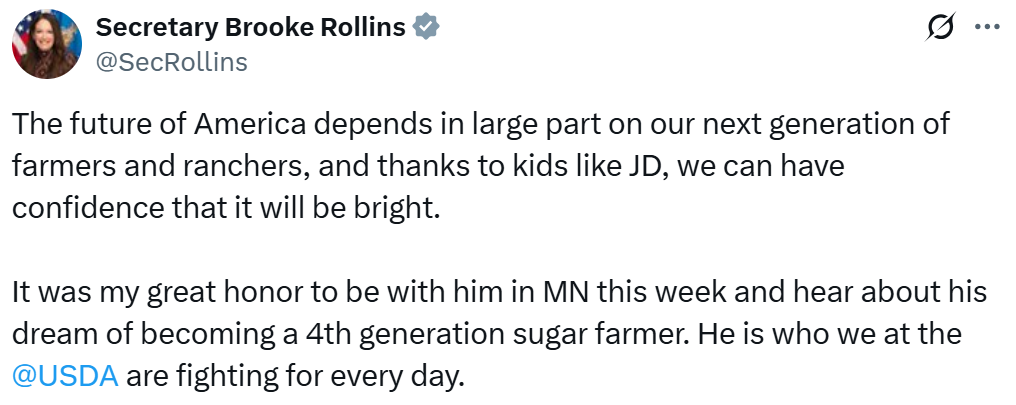
In another tweet, Secretary Rollins said that JD is her hero. It’s pretty safe to say that the feeling is mutual.
Click here to watch JD’s message to Secretary Rollins on Instagram.
Senator John Hoeven also said that “JD and his family represent the future of farming in the Red River Valley.”
That couldn’t be more true. The next morning before school, JD was back in the field working alongside his dad James and grandfather Jimmie to plant this year’s sugarbeet crop.
Watch spring planting on the Nelson family farm.
Three generations working together to grow the plants used to make all-natural, American-made sugar. JD hopes to one day farm full-time, and that can only happen with strong farm policies.

Secretary Rollins, Senator Hoeven, and Congresswoman Fedorchak also spent time talking with Neil Rockstad, a fourth-generation farmer who grows sugarbeets and serves on both the Board of Directors for American Crystal Sugar Company and as President of the American Sugarbeet Growers Association, and Marilyn Backman, a first-generation sugarbeet farmer who grows for Minn-Dak Farmers Cooperative and serves as a member of their Board of Directors.
A strong U.S. sugar policy puts American family farmers like JD, Neil, and Marilyn first, supports multi-generational farmer and worker families, and keeps us reliably supplied with sugar.
We are so grateful for leaders who listen to the voices of our sugarbeet and sugarcane farmers.
Increased Farm Costs Highlighted at USDA Forum
Why is your tractor worth more than our house?”
Minnesota sugarbeet farmer Neil Rockstad recalled a kitchen table conversation with his wife while speaking at the 101st annual Agricultural Outlook Forum. She had observed that the cost of a new tractor was worth more than their house.
The already high – and rising – cost of essential farm equipment was one of the common themes at the 101st Agricultural Outlook Forum hosted by the U.S. Department of Agriculture (USDA) in Arlington, VA, on February 28, 2025.
Both Neil and Louisiana sugarcane grower Travis Medine presented as part of the sugar panel at the forum. They observed that labor and machinery were among the highest costs in their farm budgets. Much of that machinery is highly specialized for sugarbeet or sugarcane cultivation.
“All of our harvest and processing equipment – especially in the sugarcane industry – is specific to that crop and that crop only. I can’t take my sugarcane planters and go plant anything else with them. I can’t take my sugarcane harvester and do anything other than cut grass with it – and I can tell you, you don’t want to cut grass with a half-a-million-dollar lawnmower,” Travis remarked.
Neil shared that not only is there a large upfront investment for farming implements, but the cost to fuel and maintain them is also extremely high – especially when field work requires multiple tractors. It costs $1,000 a day to fuel just one tractor.
Farmers in Louisiana are experiencing similar budget pressures. Budget modeling conducted by Louisiana State University found that for Louisiana sugarcane farmers, land rent is up about 59 percent over the past five years, fixed costs are up 62 percent, and total costs are up 43 percent.
Modern farming and incredible advancements in on-farm practices have increased efficiencies and reduced the need for inputs such as fertilizer and crop protection tools, but is also incredibly expensive.
“We’re pledging our farms, our land, our houses, our machinery against a short-term operating loan, hoping that we can make it to the end of the season without a crop disaster or a significant price downturn,” Neil said.
Both farmers noted that crop insurance is an essential risk management tool to help farmers recover and plant again following a crop disaster. Even then, crop insurance does not cover all the costs of planting and cultivating a crop or the lost revenue. Farmers must always plan for the worst-case scenario.
“We have to have enough in our budget to deal with the bad things that happen and just hope that they don’t,” Travis said.
Neil and Travis both highlighted the benefits of sugar production to their farms and rural communities. Benefits that would disappear if it was no longer financially viable to farm sugarbeets and sugarcane. Travis noted the “generational aspect of farming” and the need to create a strong succession plan.
More than anything, the farmers noted the urgent need for a five-year Farm Bill to bring greater certainty to the farm economy. The Farm Bill proposals put forth in the last Congress included a strengthened U.S. sugar policy.
Neil concluded his presentation with a plea to Capitol Hill: “Congress needs to pass a five-year Farm Bill to provide confidence for us to make all of these investment in a crop.”
Our Family Farmers Keep It Sweet
Happy National Ag Day! Today we honor hardworking farm families across the country, including our more than 11,000 sugarbeet and sugarcane farmers. These farmers help keep it sweet in America, producing a stable supply of all-natural, homegrown sugar.
We will also celebrate the first day of spring in just a few days, marking the start of a new growing season for many of our farmers, the continuation of Florida’s sugarcane harvest, and the start of California’s sugarbeet harvest. While this is a very busy time on the farm, sugarbeet and sugarcane farmers still made their annual trek to Capitol Hill at the beginning of the month, armed with just one message:
We need a new Farm Bill — now.
Our farmers take great pride in growing the crops that produce an essential food ingredient. But as sugarbeet farmer Tim Deal recently told the House Agriculture Committee, “pride doesn’t pay the bills.”
American farmers, including sugarbeet and sugarcane producers, are facing pressures from increased costs, lower crop prices, and a lapsed Farm Bill that is now more than two years overdue. A five-year Farm Bill that puts America’s farmers first and strengthens U.S. sugar policy will help support current and future generations of American sugar producers.
Watch some of our farmers share in their own words why a new Farm Bill is important to their family farms.
Sugarbeet farmer Gus Hasbargen was one of the growers recently in Washington, DC. Gus looks forward to returning to the family farm when he graduates from college this spring, but farmers like the Hasbargens need the stability and certainty of a five-year Farm Bill.
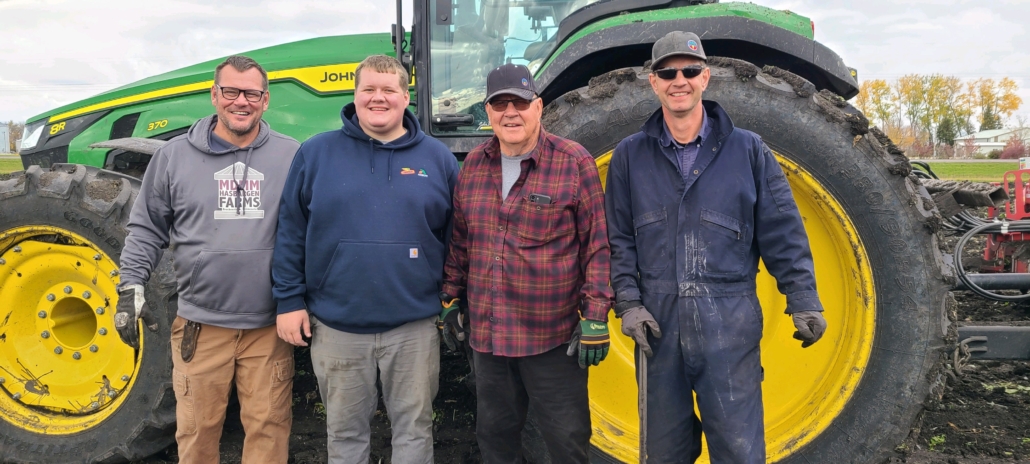
“My great-grandpa was one of the first farmers in our area to raise sugarbeets. He saw the potential in this crop, and today, we’re still building on what he started. It’s amazing to look out at the fields and know that the same land has sustained our family for generations. And that’s what we want to protect—not just for ourselves, but for the next generation of farmers.”
—Gus Hasbargen
American sugar production is an economic engine for both rural and urban communities, supporting more than 151,000 jobs across the country and generating more than $23 billion in annual economic impact. U.S. sugar policy is also designed to cost taxpayers nothing.
If we want to keep it sweet in America, we need Congress to pass a new Farm Bill.
Thank you to each of our farmers for your hard work and determination. We’re grateful for all that you do!
American Sugar Alliance Congratulates Lori Chavez-DeRemer on Confirmation as Secretary of Labor
On behalf of the nation’s sugarbeet and sugarcane farmers and workers, the American Sugar Alliance issued the following statement on Lori Chavez-DeRemer’s confirmation as Secretary of Labor:
“Secretary Chavez-DeRemer has been a great advocate for America’s sugarbeet and sugarcane farmers and we congratulate her on her well-deserved confirmation as Secretary of Labor. We were honored to host Chavez-DeRemer at last year’s International Sweetener Symposium, where she reiterated that ‘federal policies must ensure that our farmers and ranchers have the support they need.’
“America’s sugar industry is proud to offer good American jobs, many of which are union jobs and are often located in communities where other job opportunities may be limited. We look forward to working with Secretary Chavez-DeRemer to continue supporting American jobs and addressing labor challenges that harm our farms and factories.”
America’s sugar producers are proud to support more than 151,000 jobs coast to coast, drive $23.3 billion in annual economic impact, and provide a steady, affordable supply of made-in-America sugar. American sugarbeet and sugarcane farmers and workers supply approximately 75% of the sugar consumed nationwide.
American Sugar Alliance Congratulates Jamieson Greer on Confirmation as U.S. Trade Representative
On behalf of the nation’s sugarbeet and sugarcane farmers and workers, the American Sugar Alliance issued the following statement on Jamieson Greer’s confirmation as U.S. Trade Representative:
“The American Sugar Alliance congratulates Jamieson Greer on his confirmation as U.S. Trade Representative. A strong American sugar industry – which sustains more than 151,000 jobs coast to coast – reduces our reliance on unpredictable foreign suppliers, safeguards consumers from supply chain disruptions, and contributes to the vitality of family farms and small businesses across the country. We look forward to working with Ambassador Greer to advance our shared goals of enforcing global trading rules and protecting good American jobs.”
America’s sugar producers are proud to support more than 151,000 jobs coast to coast, drive $23.3 billion in annual economic impact, and provide a steady, affordable supply of made-in-America sugar. American sugarbeet and sugarcane farmers and workers supply approximately 75% of the sugar consumed nationwide.
American Sugar Alliance Congratulates Howard Lutnick on Confirmation as Secretary of Commerce
On behalf of the nation’s sugarbeet and sugarcane farmers and workers, the American Sugar Alliance issued the following statement on Howard Lutnick’s confirmation as Secretary of Commerce:
“At a time when our sugarbeet and sugarcane farmers face mounting challenges, including rising input costs and heavily subsidized foreign sugar, we are confident Secretary Lutnick will champion policies that put America’s farmers first. We congratulate Secretary Lutnick and know his leadership will be essential to ensuring a level playing field for American agriculture and securing the long-term strength of our domestic sugar industry.”
America’s sugar producers are proud to support more than 151,000 jobs coast to coast, drive $23.3 billion in annual economic impact, and provide a steady, affordable supply of made-in-America sugar. American sugarbeet and sugarcane farmers and workers supply approximately 75% of the sugar consumed nationwide.
America’s Sugar Producers: Secretary Brooke Rollins Will Put America’s Farmers First
On behalf of the nation’s sugarbeet and sugarcane farmers and workers, the American Sugar Alliance issued the following statement on Brooke Rollins’ confirmation as Secretary of Agriculture:
“We extend our heartfelt congratulations to Secretary Rollins! Her leadership comes at a critical time for American agriculture, and we stand ready to work with Secretary Rollins and the Trump administration to advance policies that put America’s farmers first.
“A key priority will be advancing a five-year Farm Bill that delivers a strong safety net for family farmers, safeguards our national food security and supply chains, and bolsters the rural economies that feed and fuel our nation. With her deep understanding of the challenges and opportunities facing rural America, Secretary Rollins is poised to lead the charge to secure a more prosperous future for U.S. agriculture.”
America’s sugarbeet and sugarcane farmers and workers are proud to support more than 151,000 jobs coast to coast, drive $23.3 billion in annual economic impact, and provide a steady, affordable supply of made-in-America sugar.
Texas Farm Fields Plowed Under Due to Treaty Noncompliance
South Texas was once home to the farmer-owned Rio Grande Valley Sugar Growers (RGVSG) cooperative, comprised of more than 100 family farmers growing sugarcane and a raw sugar mill in Santa Rosa. Due to Mexico’s failure to deliver the water it owes the United States under the 1944 Water Treaty, the mill is now shuttered and the few remaining acres of sugarcane plowed under.
Jennifer Cervantes, who has represented these farmers for more than 15 years, painted a picture of a once vibrant sugarcane industry in her statements before a House Appropriations Committee member briefing yesterday. Read her statement as prepared.
Nearly 40,000 acres of sugarcane once grew in the Rio Grande Valley, fueling the sugar mill and providing approximately 500 jobs critical to these rural communities. The loss of the RGVSG has been felt across the entire region.
“[The RGVSG cooperative] was a vital part of the region’s agricultural sector and the sugar supply chain in the U.S. The industry contributed over $200 million annually to the Texas economy, was the only producer of raw sugar in Texas, and was one of only three sugarcane-producing states left in the U.S.,” Jennifer said.
The steep decline in sugarcane acreage in Texas can be directly attributed to Mexico’s decision to not deliver the water it owes the U.S. With irrigation water supplies at critical levels, and with little water coming from Mexico, growers were forced to make the hard decision to plow out their sugarcane. In early 2023, sugarcane acreage fell from 34,000 to 16,500, and then again to 10,000 acres in early 2024. Now, there are zero acres planted to sugarcane in the Rio Grande Valley.
“Investing in and conducting required maintenance on the sugar mill to continue operating was infeasible,” Jennifer explained. “Without a sugar mill to process harvested sugarcane, the remaining sugarcane acres were plowed out – with growers bearing the losses.”
The closure of the RGVSG cooperative mill and the significant loss of agricultural production has economic consequences and national food security implications.
“Strength in our supply chains, especially for food production, occurs when diverse locations across the country can sustain production, allowing a poor crop in one region to be offset by good harvests in other regions. Mexico is blatantly appropriating water that rightfully belongs to the United States, enhancing its food security while undermining ours,” Jennifer said.
American farmers cannot survive when other countries fail to uphold their international agreements. The U.S. government must immediately support strong enforcement of the 1944 Water Treaty and ensure Mexico delivers water in a timely manner.
Jennifer stressed the urgency of the situation in Texas, asking Congress and the Trump Administration to “reset our posture with Mexico on this Treaty before more agriculture is plowed under and more livelihoods are lost.”

From left to right: Jed Murray, Texas International Produce Association; Jennifer Cervantes; Rep. Mario Diaz-Balart (R-FL-26), Chairman of the House Appropriations Committee on National Security; Rep. Monica De La Cruz (R-TX-15); Dale Murden, Texas Citrus Mutual.
Sugar 101: How U.S. Sugar Policy Keeps it Sweet in America
It’s often said that life is sweet. We know it’s made even sweeter by the farmers who grow sugarbeets and sugarcane right here in America.
Not sure what sugarbeets and sugarcane are? Check out our first installment of Sugar 101.
Now that we’ve covered where real sugar comes from, it’s time to learn more about how exactly sugar policy keeps it sweet in America. Congress backs America’s sugar producers through programs in the Farm Bill. U.S. sugar policy ensures we always put America’s farmers first.
How does U.S. sugar policy work?
When sugar is extracted from sugarbeets or sugarcane by one of our cooperatively-owned, employee-owned, or family-owned factories, mills, and refineries, we store that sugar until delivery – at our expense! That means that until our customer needs a rail car of sugar, or a pallet of bags, that sugar is held in a distribution center within our nationwide network of strategically located facilities.
Because our producers are not paid until a customer takes delivery of the sugar, which could be several months after harvest, the U.S. government offers short-term loans on the sugar held in storage. These are not subsidy checks. Once the sugar is sold, delivered, and paid for by a customer, producers with a loan repay the government with interest. There is no cost to taxpayers.
These loans provide our producers with the financial security to plant, grow, and harvest sugarbeets and sugarcane, as well as to process and store sugar.
Three things to know about U.S. sugar policy
- U.S. sugar policy puts America’s farmers first. American farmers supply about 75% of the U.S. demand for sugar. American sugar producers are efficient and meet some of the highest labor and environmental standards in the world.
- U.S. sugar policy puts American consumers first. Our strong and resilient supply chain keeps manufacturers and consumers supplied with sugar. Our sugar producers have invested heavily in a strong domestic supply chain to ensure that our customers – from food manufacturers to everyday Americans stocking their pantry – always have sugar available.
- U.S. sugar policy is contained in the Farm Bill. Sugar policy is designed to cost taxpayers $0 and is a critical component of the farm safety net for our producers. That’s because sugar producers are provided access to government loans that are repaid with interest. America’s sugarbeet and sugarcane farmers and workers are advocating for a five-year Farm Bill that strengthens the sugar safety net. Extensions of the 2018 Farm Bill do not provide the certainty that sugar producers need, and all farmers need a new five-year Farm Bill now.
U.S. sugar policy is a common-sense policy that ensures our family farmers can keep producing this essential, natural, and made-in-America food ingredient.
Stay tuned for the next edition of Sugar 101. For more sweet facts about sugar visit our website at sugaralliance.org or follow us on Instagram.
Farmer to Senate: Pride Does Not Pay the Bills
Tim Deal, a fourth-generation farmer from Minnesota, testified in front of the Senate Agriculture Committee yesterday, telling members that while he’s proud to play a role in feeding America, “pride does not pay the bills.”
Tim’s testimony on the hardships of higher input costs and greater financial pressures highlights the grave challenges facing family farmers across the country and the immediate need for a five-year Farm Bill. Read his testimony as prepared.
“This hearing is timely and important. Many growers across the country are truly struggling under very difficult economic conditions,” Tim said.
Tim grows sugarbeets in Doran, Minn., and serves as Vice President of the American Sugarbeet Growers Association and as Chairman of the board of the Minn-Dak Farmers Cooperative. Minn-Dak Farmers Cooperative is a 51-year-old grower-owned cooperative with more than 450 shareholders in Minnesota and North Dakota. In fact, every sugar factory and refinery in the U.S. is either cooperatively-owned, employee-owned or family-owed. Deal testified to the significance of this cooperative structure for farmers.
“Sugar prices for sugarbeet and sugarcane farmers have fallen by more than 10 percent over the past year. In addition, our story is complicated by the fact we must pay for on-farm expenses and investments, but also factory expenses and investments [such as capital improvements and operating costs]. That means all the increases in labor, fuel, fertilizer, and equipment costs over the past few years…fall on the sugarbeet and sugarcane farmer,” he said.
Despite these challenges, Tim noted the incredible benefits of U.S. sugar production for both taxpayers and consumers. Sugarbeet and sugarcane farmers have invested in a resilient supply chain and on-farm efficiencies. These investments, while costly for farmers, will enable American sugar production to hit a new record this year – coming on the heels of another record year. Consumers benefit from an affordable and available supply of sugar thanks to American farmers.
Yet, the Farm Bill is now woefully out of sync with the real-world stressors faced by farmers like Tim. It no longer provides a stable economic foundation for farmers to operate and produce crops for our nation’s food security.
“In addition to cost and price pressures, we are grappling with an out-of-date Farm Bill safety net,” Tim said. “Without a meaningful improvement in the safety net, many growers, including sugarbeet and sugarcane farmers, will find it harder to finance their operations.”
America’s Sugar Crop Farmers, Workers Urge Swift Senate Confirmation of Brooke Rollins
Following the Senate Agriculture Committee’s bipartisan vote to advance the nomination of Brooke Rollins as the next Secretary of the U.S. Department of Agriculture (USDA), the American Sugar Alliance issued the following statement on behalf of America’s sugarbeet and sugarcane farmers and workers:
“President Donald Trump and Secretary-designate Rollins are committed to putting America’s farmers first. Today’s bipartisan vote reaffirms that Rollins will be a champion for our farmers, workers, and rural communities. Agriculture is a vital cornerstone of our nation’s economy and food security, and America’s strong domestic sugar industry is a critical part of the American food supply.
“We urge the full Senate to confirm Secretary-designate Rollins as soon as possible.”
American Sugar Alliance Congratulates Doug Burgum on Confirmation as Secretary of the Interior
On behalf of the nation’s sugarbeet and sugarcane farmers and workers, the American Sugar Alliance issued the following statement on Doug Burgum’s confirmation as Secretary of the Interior:
“The American Sugar Alliance congratulates Doug Burgum on his confirmation as Secretary of the Interior. His leadership will be essential to ensuring that America’s farmers have the resources they need to succeed. As the former governor of North Dakota, home to the Red River Valley, the largest sugarbeet-production region in America, we know Secretary Burgum understands how important domestic sugar production is to ensure a reliable supply of a critical ingredient and to strengthen our national food security. We look forward to working with him to address the challenges facing rural communities and advancing policies that put America’s farmers first.”
America’s sugar producers are proud to support more than 151,000 jobs coast to coast, drive $23.3 billion in annual economic impact, and provide a steady, affordable supply of made-in-America sugar. American sugarbeet and sugarcane farmers and workers supply approximately 75% of the sugar consumed nationwide
American Sugar Alliance Congratulates Lee Zeldin on Confirmation as EPA Administrator
On behalf of the nation’s sugarbeet and sugarcane farmers and workers, the American Sugar Alliance issued the following statement on Lee Zeldin’s confirmation as the Environmental Protection Agency (EPA) Administrator:
“Administrator Zeldin’s leadership will be pivotal in ensuring that America’s farmers can continue to produce safe, sustainable, and affordable food. That will require a renewed focus on science-based regulatory processes that ensure farmers have effective crop protection tools. Administrator Zeldin is a proven leader who has demonstrated a willingness to learn about our industry and the workers benefiting from sugar production in his home state of New York. We congratulate Administrator Zeldin on his confirmation and look forward to working with him and his agency to address regulatory challenges so our farmers can keep it sweet in America.”
America’s sugar producers are proud to support more than 151,000 jobs coast to coast, drive $23.3 billion in annual economic impact, and provide a steady, affordable supply of made-in-America sugar. American sugarbeet and sugarcane farmers and workers supply approximately 75% of the sugar consumed nationwide.
American Sugar Alliance Congratulates Kristi Noem on Confirmation as Secretary of Homeland Security
On behalf of the nation’s sugarbeet and sugarcane farmers and workers, the American Sugar Alliance issued the following statement on Kristi Noem’s confirmation as Secretary of Homeland Security:
“Congratulations to Kristi Noem on her confirmation as Secretary of Homeland Security. We look forward to once again partnering with Secretary Noem to address the needs and priorities of America’s sugar producers. From her time in Congress and as governor of South Dakota, Secretary Noem knows well the challenges faced by the agriculture industry. That includes strong enforcement of U.S. trade and customs laws and safeguarding the supply chains that power America’s rural economies.”
America’s sugar producers are proud to support more than 151,000 jobs coast to coast, drive $23.3 billion in annual economic impact, and provide a steady, affordable supply of made-in-America sugar. American sugarbeet and sugarcane farmers and workers supply approximately 75% of the sugar consumed nationwide.
Sugar 101: Meet Your Made-In-America Sweetener
It’s a new year and there’s a new Congress in town! It’s time for a refresher on how sugar is made in America. This is the first in our new series of Sugar Beat newsletters covering the basics of sweet – so stay tuned for more Sugar 101.
What is sugar?
Real sugar is made by plants. More specifically, it’s made by sugarbeets and sugarcane. Both crops produce sucrose, or sugar – the same sugar that you use to sweeten your morning coffee or in Grandma’s homemade chocolate chip cookies. Sucrose is actually found in all green plants, including almonds, but it’s most abundant in sugarbeets and sugarcane, making them the most efficient crops for farmers to grow and extract sugar from.
Sugar serves as an essential ingredient in thousands of food products, adding flavor, acting as a preservative, balancing acidity, and more.
In America, family farmers and workers supply about 75% of our sugar.
What is a sugarbeet?
Sugarbeets are root vegetables that grow below the ground, similar to a potato or a red beet – but they’re white! Sugarbeets are mainly grown in the upper Midwest and northern Plains, but are also grown in southern California. Minnesota produces the most sugarbeets of any state in the country.
When fully grown, a sugarbeet is about a foot long, weighs two-to-five pounds, and is about 18% sucrose or sugar.
What is sugarcane?
Sugarcane is a perennial grass, meaning it regrows after harvest, with sucrose or sugar content as high as 20%. Sugarcane can grow taller than a basketball hoop!
In the U.S., sugarcane is grown in Florida and Louisiana. Sugarcane was also grown in Texas, but unfortunately, the last sugarcane mill in Texas was driven out of business in 2024 due to Mexico’s inconsistent compliance with a long-standing water treaty.
Sugarcane can be harvested for several consecutive years from one planting, and once harvested, one stalk of sugarcane can yield 30 teaspoons of sugar!
Where are sugarbeets and sugarcane grown?
The reach of America’s sugar production is coast-to-coast: Sugarcane thrives in warm climates while sugarbeets are mostly grown in areas with colder climates (although the highest-yielding sugarbeets are grown in Southern California!). Across the country, 11,000 sugarbeet and sugarcane farmers produce about 9 million tons of sugar a year on 2 million acres.
We operate a nationwide network of factories, mills, refineries, and storage facilities so sugar is always available when and where it’s needed. A strong domestic sugar industry is strategically important for American food production!
How real sugar gets from the plants to your table.
Sugar goes from plant to product in four simple steps: it is extracted from the plant, washed with water, crystalized and dried. There are slight differences in how we get sugar from sugarcane and sugarbeet that are outlined below.
Sugarcane is harvested from the field and then washed and fed into mills close to the farm. Huge rollers press out the cane juice. That juice is then clarified, concentrated and crystalized into raw sugar, which is next sent on to a sugar refinery. In those refineries, raw cane sugar gets cleaned of plant impurities by dissolving and filtering the sugar. Once the sugar’s naturally white color is revealed, the refined sugar is packaged and ready for consumption!
After harvesting, sugarbeets are washed and sliced into thin strips at a factory near the fields. The strips are then added to boiling water to extract a sugary juice, which is then filtered and boiled in a vacuum to produce a syrup containing sucrose crystals. Then, the crystals are separated from the syrup with centrifuges and dried in rotating drums. Finally, the crystals are packaged and the refined sugar is sent to customers across the country!
Every part of the sugarbeet and sugarcane is put to use. While extracting sugar is the primary goal, both processes result in many co-products which minimizes waste. Sugarbeet pulp can be used in animal and pet food while sugarcane fiber is often used to power factory operations.
American sugar factories and refineries are all cooperatively owned, employee-owned or family-owed.
Want to learn more about the process of making sugar? Check out this video or follow us on Instagram.
American Sugar Alliance Congratulates Marco Rubio on Confirmation as Secretary of State
On behalf of the nation’s sugarbeet and sugarcane farmers and workers, the American Sugar Alliance issued the following statement on Marco Rubio’s confirmation as Secretary of State:
“Congratulations to Marco Rubio on his confirmation as Secretary of State. As the former senator from Florida, Secretary Rubio understands just how deeply American sugar production is tied to America’s economy, food security, and rural communities. Secretary Rubio and the Trump administration are committed to ensuring that American industries – including sugar – remain competitive in the face of global challenges. Secretary Rubio will be a great champion for protecting U.S. agricultural interests on the world stage.”
America’s sugar producers are proud to support more than 151,000 jobs coast to coast, drive $23.3 billion in annual economic impact, and provide a steady, affordable supply of made-in-America sugar. American sugarbeet and sugarcane farmers and workers supply approximately 75% of the sugar consumed nationwide.
American Sugar Alliance Congratulates Bicameral Agriculture Committee Leaders
As the 119th Congress begins, the American Sugar Alliance (ASA) congratulates both the new and returning leaders of the Senate and House Agriculture Committees: Senate Agriculture Committee Chairman John Boozman (R-AR) and Ranking Member Amy Klobuchar (D-MN), as well as House Agriculture Committee Chairman Glenn “GT” Thompson (R-PA-15) and Ranking Member Angie Craig (D-MN-02).
“At a time when so much is at stake for American agriculture, we welcome the leadership of these lawmakers who understand the challenges facing our family farmers and are committed to a vibrant U.S. sugar industry,” said Jack Pettus, Chairman of ASA. “As input costs rise and financial pressures intensify, support for our sugarbeet and sugarcane farmers is more important than ever. We look forward to working with both committees to ensure American sugar production stays strong—and stays in America.”
The U.S. sugar industry supports more than 151,000 jobs and generates more than $23 billion in annual economic impact. Sugarbeet and sugarcane farmers depend on a strong safety net that helps them reliably supply around 75% of our domestic sugar needs.
“We know that these leaders recognize the urgency of passing a new five-year Farm Bill,” Pettus continued. “Farmers can’t afford more short-term extensions that create uncertainty and make it harder to plan for the future.”
ASA is committed to working with both the Senate and House Agriculture Committees to ensure that a five-year Farm Bill is passed and includes policies to strengthen the safety net for sugarbeet and sugarcane farmers.
From Our Families to YOUR Family: Sweetest Holidays
Sugar is an essential part of our holiday traditions. Family recipes passed down from generation to generation bring warmth and joy to the holiday season.
These sweet moments wouldn’t be possible without the sugarbeet and sugarcane farmers and workers who provide us with a made-in-America supply of real sugar. In fact, our farmers and workers meet approximately three-fourths of our domestic needs, thanks to U.S. sugar policy.
Every day, we thank America’s farmers for their hard work and dedication in putting meals on our tables.
The holiday season comes at a unique time for America’s sugar industry. Sugarcane farmers in Louisiana and Florida are still hard at work in the fields harvesting this year’s crop while sugar workers across the industry clock-in for factory shifts to turn both sugarbeets and sugarcane into the sugar in your favorite holiday treat. We continue to face new challenges, threatening our family farms and farmer-, worker-, and family-owned factories. We need a five-year Farm Bill to help us keep it sweet in America.
Congress must make passing a five-year Farm Bill that strengthens the safety net for sugar producers and provides long-term certainty for rural America a priority in the new year. It’s time we put America’s farmers first.
So, as you place sweet treats into stockings hung by the chimney with care, please remember the family farmers and workers who keep you supplied with sugar.
From our farmer and worker families to your family: we wish you the sweetest of holidays and a happy new year.
To our farmers, workers, and everyone who makes our industry sweet, thank you.



American Sugar Alliance Urges Passage of Farm Assistance
The American Sugar Alliance (ASA) appreciates congressional leaders including a one-year Farm Bill extension and much-needed financial assistance for America’s farmers in the Continuing Resolution and urges Congress to immediately pass the legislation.
Jack Pettus, Chairman of ASA and Vice President of the American Sugar Cane League, representing Louisiana’s sugar producers, issued the following statement:
“American farmers have dealt with extraordinary challenges over the past several years. We are grateful that Congress is advancing an extension of the Farm Bill while providing critical assistance, and we urge all members to pass this vital legislation. Congress must move a five-year Farm Bill as soon as possible in the new year. Congress has an opportunity to put America’s farmers first by delivering greater certainty for rural America and providing a stronger farm safety net.”
More than JUST the Farm: Our Communities and Workers Need Congress to Take Action on a New Farm Bill
America’s sugarbeet and sugarcane farmers are asking Congress to act urgently to strengthen the farm safety net. It’s important to listen as farmers share their stories. It’s just as important to recognize that farm policies affect more than just the farm — there are millions of Americans who depend on the economic engine of American agriculture.
Farm Policy Facts recently shared a piece on 10 reasons to pass a Farm Bill, noting that more than 22 million full and part-time jobs in 2022 were related to the agricultural and food sectors. Farmers and agriculture help drive our economy forward.
When it comes to agriculture, sugar is a small commodity with an outsized impact. Sugarbeets and sugarcane are grown on a little more than 2 million acres but supply three-quarters of the domestic demand for sugar while supporting more than 151,000 jobs and driving more than $23 billion in annual economic impact coast-to-coast.
The crops grown by our farmers support good American manufacturing jobs as skilled workers create a made-in-America food product for your family. Many are union jobs in areas where job opportunities can be limited.
If we want to keep good American jobs in America, Congress must strengthen sugar policy.
On behalf of our workers, farmers, and communities, we are calling on Congress to pass a bipartisan Farm Bill that supports American food manufacturing and preserves American jobs.
All of us who benefit from the bountiful and efficient food and agriculture system in America should also demand it.
🚨 It’s Time to Take Action to Strengthen the Farm Safety Net
Farmers across the country are sending an SOS to Congress: Delaying enactment of much-needed improvements to the farm safety net harms the farmers we rely on every single day to feed us.
Without a five-year Farm Bill, America will lose more farms, and we will become increasingly dependent on other countries to feed us.
We are already losing too many farms. “Farmers desperately need help,” Senate Agriculture Committee Ranking Member John Boozman (R-AR) said on the Senate floor on Monday. “Many farm families are ending 2024 in the red, unable to pay off this year’s operating loan, unable to get the loan to farm in 2025, and face the reality of being the next generation to have lost the family farm due to extreme market conditions beyond their control.”
More than five dozen financial experts and farm lenders wrote to Congress earlier this year warning that “American farmers are experiencing economic stress due to falling prices, rising interest rates, and high input costs. Sugarbeet and sugarcane sugar producers are no different.”
Our agricultural trade deficit with other countries has grown alarmingly, with America – formerly the food basket of the world – importing an expected $45.5 billion more in agricultural goods than we export. That means we are already reliant on other nations for our food and fiber. We’ve been talking a lot about the budget and policy options for a new Farm Bill, but plain and short, the policy decisions on Capitol Hill have real practical impacts on family farmers.
“It’s become so expensive to farm. We are harvesting right now in Florida, and it costs me $1,000 just to fill a tractor with diesel. The current Farm Bill just doesn’t reflect how much farmers are currently investing into agriculture.”
Keith Wedgworth
Sugarcane farmer from Florida
“As a younger farmer, I need to secure an operating loan to have the money I need upfront to purchase seed and get my crop in the ground. But since Congress hasn’t passed a new Farm Bill yet, the bank isn’t lending as much money to farmers – or they’re asking farmers to pay more for a loan. If I can’t get an affordable loan this spring, I might not be able to farm at all.”
Ben Jantz
Sugarbeet farmer from Idaho
“We’ve been through the woes of low prices before, but it takes a well-established farm to get through it and it’s hard for a young farmer to survive. Sugarbeets are the bright spot right now. I would say the other crops we grow, anything that wasn’t sold ahead last winter, we’re looking at substantial losses on those acres with the cost of production what it is.”
Lynn Johnson
Sugarbeet farmer from Minnesota
“My daughter Audrey is three and my son KJ is one. I hope that they can continue the family tradition of sugarcane farming. We need a strong Farm Bill.”
Kyle Zenon
Sugarcane farmer from Louisiana
America’s farm and ranch families are urgently calling on Congress to deliver greater certainty for rural America, provide a stronger farm safety net, and strengthen our national food security.
All of us who benefit from the bountiful and efficient food and agriculture system in America should also demand it.
American Sugar Alliance Congratulates Brooke Rollins on Nomination for Secretary of Agriculture
The American Sugar Alliance congratulates Brooke Rollins on being nominated as Secretary of Agriculture by President-elect Donald Trump.
“America’s sugarbeet and sugarcane farmers and factory workers applaud President-elect Donald Trump’s commitment to ensuring that agriculture remains a vital cornerstone of our nation’s economy and food security. Agriculture is facing historic challenges, and we look forward to working with Secretary-designate Rollins to support our farmers, protect rural communities, and preserve the most abundant and diverse food supply in the world,” said Jack Pettus, Chairman of the American Sugar Alliance.
From coast to coast, American sugarbeet and sugarcane farmers and factory workers support more than 151,000 jobs and drive $23.3 billion in annual economic activity.
American Sugar Alliance Congratulates Strong Congressional Leadership Team
The American Sugar Alliance congratulates Senator John Thune (R-SD) on his election as Majority Leader of the Senate and Representative Mike Johnson (R-LA-04) on his re-election as Speaker of the House. Each of these members will spearhead leadership teams with strong representation from sugar-producing states.
“American farmers are vital to American strength and food security, and we are encouraged to see such strong agricultural champions positioned in these key leadership roles. We extend our sincere congratulations to Majority Leader-elect Thune and Speaker Johnson on their sweet wins,” said Jack Pettus, Chairman of the American Sugar Alliance and Vice President of the American Sugar Cane League, representing Louisiana’s sugar producers.
From coast-to-coast, American sugarbeet and sugarcane farmers and factory workers support more than 151,000 jobs and drive $23.3 billion in annual economic activity.
“Both the Senate and House leadership teams will be comprised of members who have a first-hand understanding of why we must keep American sugar production in America. We look forward to working with Majority Leader-elect Thune and Speaker Johnson as we advocate for our farmers, workers, and the rural communities they support,” Pettus continued.
The American Sugar Alliance is urging Congress to pass a five-year Farm Bill that strengthens the sugar safety net as soon as possible because farms and farmland are under stress with weakening prices and high costs. A new Farm Bill must reflect the realities farmers and ranchers currently face as they feed, fuel, and clothe America and so much of the world.
A Sweet Celebration of National Farmer’s Day
This National Farmer’s Day, we will be celebrating America’s sugarbeet and sugarcane farmers and everything they do to make our lives sweeter.
Our 11,000 sugarbeet and sugarcane family farmers support over 151,000 American jobs coast-to-coast. In many of these communities, sugar is the main engine of economic growth. Rooted in farmer-, employee-, and family-owned cooperatives, our industry contributes more than $23 billion annually to the U.S. economy.
Behind these numbers are multi-generational legacies – farmers who have worked the land for decades, passing down their passion and their pride in growing the food we eat, upholding the highest environmental standards, and ensuring a reliable supply of made-in-America sugar.
Meet some of America’s sugar producers:
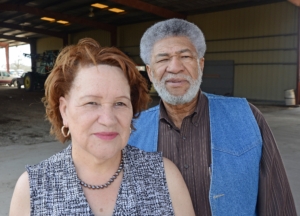
Sugarcane farmers Charles and Wanda Guidry
Erath, LA
“Sugar is very important in our community. It’s created a whole lot of jobs.”

Sugarbeet farmer Lynn Johnson
Ada, MN
“It’s not just the farmers [who benefit from U.S. sugar policy], but the people that support the industry, all the people that come and help us, the truck drivers, the people that sell equipment, that service equipment, the seed people, our suppliers.”

Sugarcane farmer Keith Wedgworth
Belle Glade, FL
“Agriculture is the best industry out there. It’s one of the last that is family-oriented.”
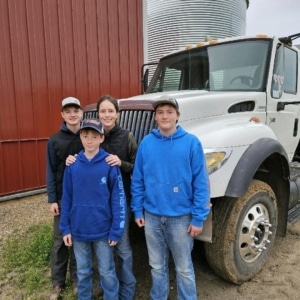
Sugarbeet farmer Laura Rutherford
Grafton, ND
“I want to be able to pass [the farm] on to [my kids]. I think that’s what keeps all farmers going through the good years, the bad years, and the really bad years.”
The grit and dedication of our farmers inspire us every day. That’s why we are fighting for a bipartisan Farm Bill that will help them continue these family farming legacies and #KeepItSweet in America.
Stay connected. Follow the American Sugar Alliance on X, Facebook, and Instagram for updates and to learn more about the hard work of America’s sugarbeet and sugarcane farmers.
The Growing Importance of a 2024 Farm Bill
In a recent op-ed for Agri-Pulse, Dr. Rob Johansson, Director of Economics and Policy Analysis for the American Sugar Alliance and former Chief Economist at the U.S, Department of Agriculture (USDA), urged Congress to pass a new Farm Bill before the year ends.
Over the past two years, Congress has held numerous hearings that have documented a brewing financial crisis caused by falling commodity prices, high input costs, and tightening farm credit. Members have heard from farmers and ranchers across the country about the need for a new Farm Bill. Now, it’s time for Congress to act. Waiting would be a mistake.
I was the chief economist at the Department of Agriculture when the last farm bill was written and saw firsthand the impacts on our agricultural and food system caused by the changing climate, a trade war, and a global pandemic. It is important to have an updated farm bill to provide certainty for American farm families as they plan for a period of tightening operating margins and deteriorating credit conditions.
Significantly higher production costs and greater weather challenges have made it harder for family farms across the country to survive.
USDA is projecting the largest two-year decline in cash income for farmers and ranchers since the Great Depression. Since the last Farm Bill, input costs are up 33 percent, creating serious financial headwinds for many of America’s family farmers and ranchers…
The level of farm assistance has fallen to its lowest level relative to farm income since 1981. It is clear the current suite of farm programs is fraying at the edges. Farms are leaving agriculture. Farmland is getting paved over. America is importing more and more food. U.S. agribusinesses are shuttering facilities in the Corn Belt and moving them to Mexico. And Congress is continually having to fill in gaps caused by an inadequate safety net.
America is losing farms – harming our economy and our national food security – and it’s time for Congress to act on a five-year Farm Bill that strengthens the farm safety net.
Because of American farm families, we have the most abundant and diverse food supply in world. Our farmers and ranchers are as efficient and productive as any in the world. We can’t risk that by making them wait longer for programs that reflect today’s realities. They need improved certainty now for securing credit needed for the next planting season and longer-run investments in productivity.
The message is clear. Hard-working American farmers and ranchers across the country are asking Congress to pass a bipartisan Farm Bill this year.
[F]arm and ranch families are urgently calling on Congress to pass a bipartisan farm bill that delivers greater certainty for rural America, provides a stronger farm safety net, and strengthens our national food security. All of us who benefit from the bountiful and efficient food and agriculture system in America should also demand it.
Read Dr. Johansson’s full op-ed in Agri-Pulse to see why Congress should pass a strong Farm Bill.
Spooky Tales of No Chocolate in Trick-or-Treat Baskets? Look to Cocoa Shortage… Not Sugar
By Dr. Rob Johansson, Director of Economics and Policy Analysis
The volatility of the cocoa market has led to some truly spooky headlines over the past year, including cautionary tales of candy shortages. It’s inevitable that these headlines will rise from the dead again this Halloween and opponents of U.S. sugar policy may choose to take this opportunity to take a stab at sugar producers.
But if your Halloween basket is light on chocolate this year, it’s cocoa that’s the culprit – not sugar.
Chocolate, a key ingredient found in many Halloween favorites, is made from cocoa beans. And nearly 60% of the world’s cocoa beans come from just two countries: Ivory Coast and Ghana. Both countries have had several years of terrible harvests, leading to a global deficit of cocoa and prices 200% higher than just three years ago.
The prices for some other key candy ingredients, including dairy, oil, and sugar, by comparison have remained relatively unchanged over that same period.
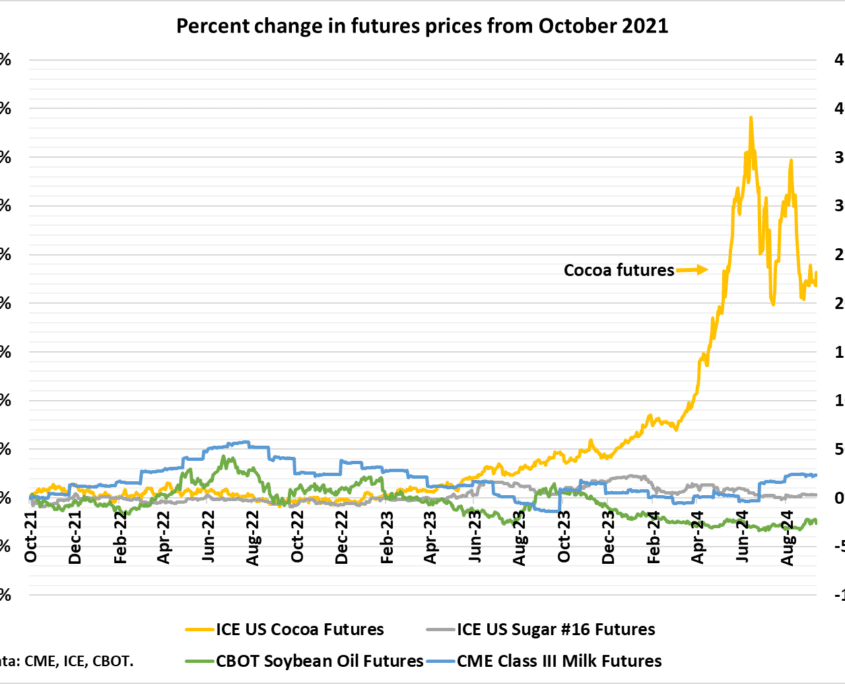
Thankfully, U.S. sugar policy has provided Halloween candy manufacturers with stable sugar prices and a reliable domestic source for an essential ingredient. Not to mention, the cost of the sugar in your favorite Halloween treat is likely just a penny or two, and research from the University of Tennessee has shown that there is little-to-no correlation between changes in sugar prices and the prices that grocery shoppers ultimately pay for sweet treats.
Frighteningly, very little of the cost of candy goes back to sugarbeet and sugarcane farmers.
Our farmers and factory workers take immense risks to plant, raise, harvest, store, and process the crops that sweeten our celebrations. Let’s make sure we don’t falsely point to them as the boogeyman this Halloween season.
USDA Reports Confirm: Foreign Sugar Subsidies as Sour as Ever
If you thought the global sugar market was cleaning up its act after being named one of the world’s most distorted commodity markets – think again.
Every year, the U.S. Department of Agriculture puts together thousands of reports, published as part of the Global Agricultural Information Network (GAIN), including annual reports that detail many ways foreign governments are intervening in their domestic sugar markets. The foreign subsidies and market controls detailed in these GAIN reports influence how sugar is sold on the highly volatile world sugar market, and ultimately underscore the importance of U.S. sugar policy. These reports do not delve into all the ways foreign countries support their sugar industries, such as through exchange rate and credit policies, nor do they quantify those supports as some other reports might (see, for example, 2021/22 calculations of $17.6 billion in support to the Indian sugar industry).
We’ve saved you some time and pulled every mention of sugar, compiled into an easy-to-read report here.
For most sugar-producing countries, protecting their domestic farmers, processors and markets are their primary policy objectives to ensure food security and economic stability. In fact, we found the GAIN reports detailed some sort of government intervention in 28 countries! These 28 countries typically supply 85% of the world’s exports, with more than 70% of the world’s exports coming from just three countries (Brazil, India, and Thailand).
Nearly every GAIN report we reviewed indicated that foreign countries are increasingly concerned about the competition that their domestic sugar crop farms and mills are facing from cheap, imported sugar. Essentially, most sugar-producing countries cannot compete with the highly subsidized world market and have protections in place to maintain a strong domestic industry. To do that, most countries have implemented some form of trade restriction, ranging from banning or limiting exports to increased import duties and other import controls.
The most extreme example of government oversight can be seen in India. It’s no surprise that India is the poster child of bad behavior here, as it subsidized its sugar industry by a whopping $17.6 billion in 2022 – even after being found in violation of its World Trade Organization commitments on sugar in December 2021.
Outside of government export controls, several countries also offer incentives to promote domestic sugar, such as rebates (i.e., tax cuts) for use of domestically produced sugar and ethanol blend requirements using sugarcane ethanol.
These reports show that the world market is neither a free nor fair market. Until a true free market can be developed – one where every country drops their market-distorting subsidies – Congress should continue to support a strong U.S. sugar policy in the Farm Bill. U.S. sugar policy is designed to cost taxpayers nothing while supporting family farmers, good American manufacturing jobs, and our national food security. Talk about sweet!
Seattle Times Op-ed: Farm Bill is a Sweet Deal for WA
Ryan Munn, a third-generation sugarbeet farmer from Washington State, recently advocated for the passage of a strong Farm Bill in The Seattle Times. Growing sugarbeets has been a vital part of his family’s crop rotation for more than 30 years.
“The Farm Bill is essential to our livelihood, as it provides a stable safety net, allowing us to grow the agricultural commodities that form the foundation of our food supply. Today, R. Munn Farms grows sugar beets, along with onions, shallots, carrots, turf grass seed, wheat, peas and beans. All these crops are touched by various provisions in the Farm Bill.”
Hardworking sugarbeet and sugarcane farmers like Ryan depend on a robust safety net and strong sugar policy in the Farm Bill. They’re asking that Congress work together to pass a bipartisan and highly effective five-year Farm Bill as soon as possible.
“Rising production costs and weather challenges have made it harder for family farmers to survive, and without a strong Farm Bill, our farm and our ability to contribute to our communities would be in peril. We want Congress to pass a bill that better reflects these current economic realities.”
Sugar production creates revenue and jobs that sustain local communities across the country. In Washington State, sugarbeet production supports more than 240 jobs, contributes $28 million annually to the state’s economy, and generates over 88,000 tons of sugar. But this all depends on passing a strengthened sugar policy provision in the Farm Bill to help ensure our family farmers, like Ryan, can continue to provide an affordable and reliable supply of made-in-America sugar.
“The time is now. Hardworking farm families like mine need your support. We know that Americans prefer American-made sugar, and we want to be here to supply it. Congress must pass a strong Farm Bill to protect farmers and ranchers across the country and ensure we can continue growing sugar crops and produce this essential ingredient.”
Read Ryan’s full op-ed in The Seattle Times to better understand the importance of the Farm Bill to sugar producers in Washington and around the country.
Keeping It Sweet in Seattle
The urgent need to pass a five-year Farm Bill took center stage at the 39th International Sweetener Symposium in Seattle earlier this month, where farm leaders from the sugar industry gathered with lawmakers and policymakers to review the legislative and economic landscape.
With the Farm Bill extension scheduled to expire in the coming weeks, this year’s discussions were timely, and the key takeaway was clear: there is unity and momentum from both farm country and Capitol Hill for a Farm Bill that includes a strong U.S. sugar policy to support sugarbeet and sugarcane farmers and more than 151,000 American jobs.
A bipartisan show of support. Even in the height of an election year, the Symposium featured lawmakers on both sides of the aisle voicing unwavering support for the sugar industry and a strengthened safety net as they committed to advancing the Farm Bill. From House and Senate Agriculture Committee leaders…
- “[The bipartisan Farm, Food, and National Security Act of 2024] will give renewed strength to the farm safety net, just as producers need it most.” – Rep. Glenn Thompson (R-PA-15), Chairman of the House Agriculture Committee
- “My Farm Bill proposal, the Rural Prosperity and Food Security Act, helps sugar growers by improving loan rates and making other important changes to the sugar program.” – Sen. Debbie Stabenow (D-MI), Chairwoman of the Senate Agriculture Committee
- “Our framework strengthens and protects sugar policy for growers, and we facilitate the movement of more domestic sugar into the marketplace for those who use it.” – Sen. John Boozman (R-AR), Ranking Member of the Senate Agriculture Committee
- “Sugar is so important. We can do without a lot of things, but the one thing we cannot do without is sugar.” – Rep. David Scott (D-GA-13), Ranking Member of the House Agriculture Committee
…to key lawmakers who hail from the Pacific Northwest.
- “Together, we can ensure the Farm Bill remains a pillar of support for our producers, helping them to thrive for generations to come.” – Rep. Lori Chavez-DeRemer (R-OR-05)
- “I know that passing a comprehensive Farm Bill is of the utmost importance to our farm economy.” – Rep. Dan Newhouse (R-WA-04)
- “Many of these jobs and investments are in rural communities, and I certainly am committed to strengthening these communities through the investments that we make through infrastructure, our roads and bridges and highways and ports.” – Rep. Rick Larsen (D-WA-02), Ranking Member of the House Transportation and Infrastructure Committee
Sweetener users and sugar producers team up. Speaking on behalf of the Sweetener Users Association (SUA), Randy Green called the Farm Bill under consideration in the House “responsive and positive,” saying it would result in more American-made sugar.
- “The Users view [the bill] as a pretty balanced package. It seems to us that the committees have been responsive to both the needs of both growers and users. From our members’ standpoint, we want a prosperous domestic sugar industry. That’s good for us, and good for you.”
Dr. Rob Johansson, ASA’s director of economics and policy analysis agreed, saying that improvements to sugar policy “will ensure our farmers and workers can continue providing SUA members with American-made sugar, while lessening our dependence on foreign countries for this essential ingredient.”
“So important to the country.” Neil Rockstad, a fourth-generation sugarbeet farmer from Minnesota, and Keith Wedgworth, a fourth-generation sugarcane farmer from Florida, joined RFD-TV from Seattle to talk about the ongoing discussions. They highlighted the critical importance of the farm bill in ensuring stability amid inflationary pressures and rising operating costs.
- As Neil said, “I think everybody can agree that domestically produced sugar and domestically produced food is so important to the country… It’s so critical that we get a legislative baseline we can take as producers to our lenders next year as we secure operating loans and have five years of certainty moving forward.”
Watch Neil and Keith’s interview, and check out more highlights from this year’s Symposium.
Washington, Oregon Lawmakers Speak at Sugar Conference in Bipartisan Show of Support for Sugar Policy
Seattle, WA – In a bipartisan show of support for U.S. sugar policy, Rep. Lori Chavez-DeRemer (R-OR-05), Rep. Rick Larsen (D-WA-02), and Rep. Dan Newhouse (R-WA-04) all provided remarks at the U.S. sugar industry’s 39th annual conference, the International Sweetener Symposium, in Seattle, WA, this week.
Each of the members noted the importance of agriculture – particularly sugarbeets – to the region. Sugar production has a significant impact on the economy in the Pacific Northwest. In Washington State, sugarbeets drive $28 million in annual economic impact and in Oregon, sugarbeets drive $128 million in annual economic impact.
Farmers across commodities are facing rising production costs and greater weather challenges that have made it harder for family farms to survive.
“As one of the few farmers in Congress, I understand the unique challenges our producers face and have been working hard to ensure the long-term success of America’s agricultural industry,” Rep. Newhouse, a member of the House Appropriations Committee, said in his recorded remarks at the International Sweetener Symposium. “I know that passing a comprehensive Farm Bill is of the utmost importance to our farm economy.”
Rep. Newhouse expressed support for the strengthened policy provisions in the Farm Bill passed out of the House Agriculture Committee in a bipartisan vote.
Rep. Chavez-DeRemer, a member of the House Agriculture Committee who voted for the bipartisan Farm, Food, and National Security Act of 2024 when it passed the committee, also spoke about the need for a stronger farm safety net.
“I know that a strong farm safety net is essential to the growth and success of family farms. Federal policies must ensure that our farmers and ranchers have the support they need,” said Rep. Chavez-DeRemer. “Together, we can ensure the Farm Bill remains a pillar of support for our producers, helping them to thrive for generations to come.”
“If we don’t have food security, we don’t have national security. We are the breadbasket of the world and people are counting on us,” she said.
American agriculture is critical to maintaining a robust food supply. Rep. Larsen, Ranking Member of the House Transportation and Infrastructure Committee, addressed the need to make investments in our domestic supply chains..
“Nationwide, the sugar industry supports over 150,000 jobs and contributes over $23 billion annually to the national economy. Many of these jobs and investments are in rural communities, and I certainly am committed to strengthening these communities through the investments that we make through infrastructure, our roads and bridges and highways and ports, to ensure that goods and people can move efficiently throughout the country and of course around the world,” said Rep. Larsen.
America’s sugarbeet and sugarcane farmers and workers are grateful to Reps. Chavez-DeRemer, Larsen, and Newhouse for their continued support of American agriculture and a strong U.S. sugar policy.
Sweetener Users, Sugar Producers Join in Support of Strengthened Sugar Policy
Seattle, WA – Sugar is a vital ingredient in our national food supply, and U.S. farmers, workers, and food manufacturers support the sugar policy provisions in the bipartisan Farm, Food, and National Security Act of 2024. Randy Green, speaking on behalf of the Sweetener Users Association (SUA) at the American Sugar Alliance’s (ASA) 39th International Sweetener Symposium, called the bill “responsive and positive” and would result in more American-made sugar.
“The Users view [the bill] as a pretty balanced package. It seems to us that the committees have been responsive to both the needs of both growers and users,” Green said. “From our members’ standpoint, we want a prosperous domestic sugar industry. That’s good for us, and good for you.”
ASA continues to assert that a strengthened sugar policy would better reflect the current economic realities affecting sugarbeet and sugarcane farmers and workers. That is vital to ensuring that American farmers and workers can continue to grow and refine the sugar crops that supply American food manufacturers. The SUA agrees.
Both the Farm, Food, and National Security Act, passed out of the House Agriculture Committee earlier this year, and the Senate Farm Bill proposals include provisions that will provide additional financial security to sugar producers as well as implement technical updates to provide more sugar to the market earlier in the year.
“Growing the food we eat has become significantly more expensive. The commonsense improvements to sugar policy put forward by both the House and Senate better reflect the economic realities of planting, cultivating, harvesting, and refining sugarbeets and sugarcane. That will ensure our farmers and workers can continue providing SUA members with American-made sugar, while lessening our dependence on foreign countries for this essential ingredient,” said Rob Johansson, ASA’s Director of Economics and Policy Analysis.
Domestic sugar production fulfills about 75% of America’s sugar needs. Together with imports from more than 70 countries, America always has access to affordable sugar. However, both Green and Barbara Fecso, who manages the U.S. sugar program at the U.S. Department of Agriculture (USDA), pointed to the challenges presented this year by an ongoing supply shortage from Mexico.
“Current market demands, in conjunction with low tariffs that have not risen with inflation for nearly 30 years, have led to additional sugar entering the U.S. market from the world market,” explained Johansson. “This demonstrates the flexibility of U.S. sugar policy. USDA has administered U.S. sugar policy in a way that ensures the market is adequately supplied with sugar and the global market has supplied more when needed.”
House, Senate Ag Leaders Show Support for U.S. Sugar Policy
Seattle, WA – The bipartisan, bicameral leaders of the congressional Agriculture Committees reiterated their support for U.S. sugar policy during the 39th International Sweetener Symposium this week, hosted by the American Sugar Alliance.
In recorded remarks, House Chairman GT Thompson (R-PA-15), Ranking Member David Scott (D-GA-13), Senate Chairwoman Debbie Stabenow (D-MI), and Ranking Member John Boozman (R-AR) each emphasized the importance of maintaining a strong domestic sugar industry and remarked on the vital role sugar plays in feeding America.
“Sugar is so important. We can do without a lot of things, but the one thing we cannot do without is sugar,” said Ranking Member Scott.
As the primary architects of the next Farm Bill, these leaders have invested significant time listening to the concerns of America’s sugarbeet and sugarcane farmers and workers.
“Across the country, the message I heard loud and clear is that farmers are struggling, and the safety net is inadequate. Between low commodity prices and high input costs, the margin squeeze is getting more serious as each day goes by,” Chairman Thompson explained.
Both the House and Senate Committees have released Farm Bill proposals to better support the ability of farm families and workers to grow, harvest, process, and deliver sugar to American families and food manufacturers.
“[The bipartisan Farm, Food, and National Security Act of 2024] will give renewed strength to the farm safety net, just as producers need it most,” Thompson continued. “On sugar specifically, not only did we deliver on critical policy improvements for domestic growers and processors, we were able to do so in a way that enhances the sugar supply chain which garnered the support of sugar users, making this the first ever Farm Bill supported by both sides of the industry.”
Chairwoman Stabenow spoke to the vast contributions of the U.S. sugar industry, which supports more than 151,000 jobs and more than $28 billion in annual economic activity, and the need to move a bipartisan Farm Bill.
“Sugar may be sweet, but your role in the American economy, and in communities across the country, is even sweeter,” Chairwoman Stabenow said. “I am hard at work to enact a bipartisan Farm Bill by the end of the year. My Farm Bill proposal, the Rural Prosperity and Food Security Act, helps sugar growers by improving loan rates and making other important changes to the sugar program.”
America’s sugarbeet and sugarcane farm families need a bipartisan, bicameral, and highly effective Farm Bill.
Ranking Member Boozman highlighted the need for additional farm support as well as underscored the importance of a strong domestic supply chain for sugar.
“Farmers are facing challenges ranging from historic inflation, record trade deficit, rising interest rates, devastating natural disasters, and global disruptions,” Ranking Member Boozman said. “Senate Republicans have released a framework that addresses those concerns… Our framework strengthens and protects sugar policy for growers, and we facilitate the movement of more domestic sugar into the marketplace for those who use it.”
The American Sugar Alliance will continue working alongside the House and Senate Agriculture Committees to encourage Congress deliver greater certainty and a strengthened safety net through a five-year Farm Bill as soon as possible.
Farm Lenders, Financial Experts to Congress: Support U.S. Sugar Policy
Five dozen farm lenders and financial experts sent a letter today to House and Senate Agriculture Committee leadership urging Congress to strengthen U.S. sugar policy in the Farm Bill and oppose any efforts to weaken the farm safety net.
“An effective safety net is essential when lenders consider extending operating loans to farmers, given the high levels of investments necessary to run a successful sugarbeet or sugarcane operation and the financing necessary for processing those crops into raw and refined sugar,” the letter states.
Improvements to U.S. sugar policy will help sustain a “stable financial framework for continued investment by family farmers at the farm and sugar processing levels,” the experts assert.
This letter was signed by national lender CoBank, as well as 59 other financial institutions, Certified Public Accountants, and tax professionals collectively operating in more than a dozen states. These experts have an intimate understanding of the financial challenges facing America’s farmers. The costs of growing sugarbeets and sugarcane have drastically increased by more than 30% since the 2018 Farm Bill.
Any efforts to undermine the effectiveness of our no-cost U.S. sugar policy would “increase the likelihood of farmers defaulting on their operation loans… and generally raise the financial risk associated with sugar production.”
While opponents to U.S. sugar policy would rather open the U.S. sugar market to unlimited foreign subsidized sugar imports, the consequences would be dire:
- Multi-generational family farms and more than 151,000 jobs throughout the sugar supply chain – many of which are union jobs – would be threatened.
- Production of this critical food ingredient would be outsourced to foreign suppliers who may not meet the same sustainability, labor, and environmental standards as American sugar producers.
- Food and candy manufacturers would be left wholly dependent on unreliable foreign sugar supply chains, threatening our national food security.
U.S. sugar policy has garnered a broad coalition of bipartisan support as Congress considers a five-year Farm Bill. The Farm Bill must keep it sweet in America by delivering greater certainty and a strengthened safety net for America’s farm and ranch families.
Farm to Treat: Celebrating Our Farmers During National Candy Month
Every June, we celebrate the official start of summer alongside National Candy Month. Candy – in all its delightful forms – brightens smiles, livens celebrations, and serves as a small pleasure in our daily lives.
These treats certainly have a way of making our lives more delicious, and we’re thrilled to join in the sweetness by highlighting the important role American sugar producers play in making National Candy Month possible.
So, let’s celebrate the treats we love and the policies and people who make them possible, too. Our sugarbeet and sugarcane farmers and producers work day-in and day-out to provide the high-quality, made-in-America sugar that is the hallmark of your favorite treat and an essential ingredient in so many other foods.
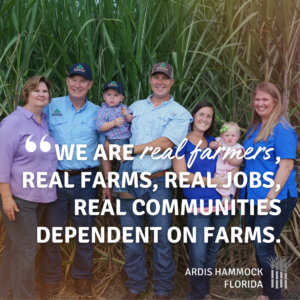
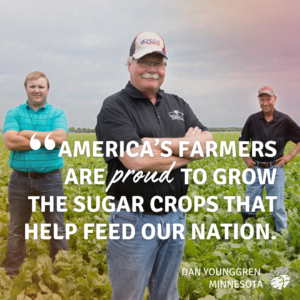
This is all made possible by a strong U.S. sugar policy. In fact, a study conducted by economists at the University of Tennessee analyzed the profits and risk of the confectionary industry and found that the high profitability and low volatility of the industry can be attributed, in part, to U.S. sugar policy. That’s because U.S. sugar policy provides a reliable supply of domestically produced sugar and the flexibility to ensure that supply always meets demand. Talk about sweet!
Sugarbeet and sugarcane farmers are key to keeping candy manufacturing lines humming, but like many other farmers, they are facing significant headwinds due to persistently high input costs and weather challenges from Mother Nature. To keep the Made-in-America sugar flowing, farmers need a strong, bipartisan five-year Farm Bill that delivers a strengthened safety net for sugar producers.
While we savor our favorite treats, let’s also indulge in some facts:
- The sugar industry contributes $23.3 billion to the U.S. economy every single year.
- Thanks to U.S. sugar policy in the Farm Bill, American farmers and workers supply 70-75% of America’s sugar needs.
- U.S. sugar policy ensures that we always have sugar available—every year there are over 3 billion pounds of surplus sugar.
- Sugar creates more than 151,000 U.S. jobs in more than two dozen states.
- And all that comes at zero-cost to taxpayers and an affordable cost to consumers.
Americans prefer made-in-America sugar 8 to 1, so let’s keep our farms here instead of offshoring our production. That way we can keep celebrating National Candy Month year after year.
America’s Sugarbeet and Sugarcane Farm Families, Factory Workers Applaud the Strong Sugar Provisions Included in Senator Boozman’s Farm Bill Framework
On behalf of America’s sugarbeet and sugarcane farm families and the factory workers from across the country represented by the American Sugar Alliance, Neil Rockstad, a Minnesota sugarbeet grower, fourth-generation farmer and President of the American Sugarbeet Growers Association, and Patrick Frischhertz, a Louisiana sugarcane grower and eighth-generation farmer, issued the following joint statement in response to the Farm Bill framework released this week from Senate Agriculture Committee Ranking Member John Boozman, R-AR:
“Our farm families need a bipartisan, bicameral, and highly effective Farm Bill. Senator Boozman’s proposal represents another positive step towards its enactment. We thank Ranking Member Boozman for his diligent efforts to understand the needs and concerns of the American sugar industry and to respond with improvements to sugar policy similar to those championed by Senate Chairwoman Stabenow and House Chairman Thompson. We stand ready to work with the Senate and House Agriculture Committees to encourage Congress to make this shared goal a reality this year. This effort is vital to delivering greater certainty and a strengthened safety net for America’s farm and ranch families.”
Statement on House Committee Passage of Farm Bill with Strengthened Sugar Policy
The American Sugar Alliance issued the following statement on the bipartisan passage of the Farm, Food, and National Security Act of 2024 by the House Agriculture Committee:
“Yesterday’s bipartisan committee passage of the Farm, Food, and National Security Act of 2024 includes strengthened sugar policy provisions that will help ensure our family farmers and workers can continue to provide an affordable and reliable supply of made-in-America sugar. We greatly appreciate Chairman Thompson’s leadership on this issue and urge Congress to enact a strong, bipartisan five-year Farm Bill this year that will deliver greater certainty for stakeholders and a strengthened safety net for America’s farm and ranch families.”
India Continues Bitter Sugar Subsidies
A new U.S. government report on India’s egregious trade practices, co-authored with the government of Australia, once again demonstrates the importance of a robust U.S. sugar policy.
As Congress is preparing to debate a five-year Farm Bill that includes a strengthened safety net for American sugar crop farmers – at no cost to U.S. taxpayers – U.S. and Australian officials are providing evidence to the World Trade Organization (WTO) of the billions of dollars in subsidies India has lavished on its producers.
India subsidized its sugar industry by a whopping $17.6 billion in 2022. Those subsides are “vastly in excess of levels permitted under WTO rules,” according to the report, and continued even after a dispute panel ruled in 2021 that India had violated its WTO commitments on sugar.
India continues to be the poster child of a world sugar market that is, at best, dysfunctional, and at worst, prone to volatile market swings due to manipulation. In fact, even after that dispute panel finding that India was subsidizing its industry by $13.4 billion in 2018, the subsidy levels continued to climb to $15.9 billion in 2019, $14.6 billion in 2020, $16.5 billion in 2021 and $17.6 billion in 2022. And those amounts do not even include the supports that India has been providing its sugarcane ethanol sector, which also serve to distort the world market.
Ultimately, billions of dollars in foreign sugar subsidies from huge sugar producing countries like India and Brazil encourage the over production of sugar. That surplus sugar gets dumped on global markets, driving world sugar prices down below the costs of producing that sugar.
Unlike other countries, U.S. sugar crop farmers and workers produce a reliable supply of sugar under some of the world’s highest safety, labor, and environmental standards and at zero cost to taxpayers. India, on the other hand, is openly flaunting its WTO commitments to fair trade and repeatedly violating the rules. That is why Congress does not allow heavily subsidized foreign sugar to be dumped on our market.
The U.S. sugar industry has repeatedly called for an end to all global sugar subsidies, a concept known as zero-for-zero, and a modernized WTO that brings transparency and accountability to the world sugar market.
Until a true free market can be developed, weakening U.S. sugar policy would sacrifice our efficient American farmers to predatory practices, threaten 151,000 jobs, and undermine our national food security. All to benefit countries like India that continue to cheat the system with a bitter scheme of subsidies.
Support U.S. sugar producers by supporting a strengthened U.S. sugar policy.
America’s Sugarbeet and Sugarcane Farm Families, Factory Workers Applaud the Strong Farm Safety Net in House Farm Bill
On behalf of America’s sugarbeet and sugarcane farm families and the factory workers from across the country represented by the American Sugar Alliance, Neil Rockstad, a Minnesota sugarbeet grower, fourth-generation farmer and President of the American Sugarbeet Growers Association, and Patrick Frischhertz, a Louisiana sugarcane grower and eighth-generation farmer, issued the following joint statement on the draft text release of the House Agriculture Committee’s Farm, Food, and National Security Act of 2024:
“As farmers, we’re proud to play a critical role in feeding America, yet high production costs, rising foreign subsidies, predatory trade practices, and often Mother Nature have conspired to make it very difficult for family farms like ours to survive. That’s why we are so grateful that the Farm Bill text released on Friday by Chairman GT Thompson provides a strong new safety net for our farm families. Chairman Thompson and his team worked tirelessly to craft the Farm, Food, and National Security Act of 2024, spending countless hours listening to the concerns of farmers and ranchers, and we commend him for his outstanding leadership.
“We thank the House Agriculture Committee for the strengthened U.S. sugar policy contained in this bill which will help ensure that America’s 11,000 sugarbeet and sugarcane farmers and our workers can continue producing an essential ingredient in our food supply, maintain resilient supply chains, and meet the needs of American families and all of our customers.
“Our farm families need a bipartisan, bicameral, and highly effective Farm Bill. This legislation from Chairman Thompson is the first major step towards the enactment of the 2024 Farm Bill. We stand ready to work with Chairman Thompson and all congressional leaders to make this shared goal a reality this year. This effort, particularly the farm safety net features for sugarbeet and sugarcane farm families in Chairman Thompson’s bill, merits lawmakers’ strong support.”
Colorado, Montana Sugarbeet Farmers Urge Congress to Support Sugar Policy
With the next Farm Bill on the horizon, two sugarbeet farmers recently took to the pages of their homestate papers to praise U.S. sugar policy for keeping our food supply secure and supporting their family farms. U.S. sugar policy must be preserved and strengthened in the next Farm Bill.
Colorado farmer Paul Schlagel grows sugarbeets in Boulder County for Western Sugar Cooperative. His family farm has been in operation for more than 100 years. Paul wrote in his op-ed for the Colorado Springs Gazette that the economic pressures and significant cost increases facing farmers requires a stronger farm safety net.
“It is more important than ever that we have the strongest safety net possible to sustain current [sugar] production levels and maintain our national food security,” Paul wrote. “Without a strong safety net, family farms like mine would be driven out of business and countless jobs would be eliminated.”
In Montana, farmer Shane Strecker, who also grows sugarbeets for Western Sugar Cooperative, pushed back against farm policy critics in the Billings Gazette. Shane pointed to the recent closure of Sidney Sugars in Montana and the resulting economic and job losses as a warning sign of what could happen if U.S. sugar policy were weakened.
“Letting farms like mine fail by eliminating a policy that costs taxpayers nothing would mean fewer American jobs and more food grown in [sugar] subsidizing countries like Brazil and India. That’s not a risk I’m willing to take, and I bet most Americans aren’t either,” Shane wrote.
Sugar crop farmers like Paul and Shane are critical to maintaining a strong and resilient domestic supply of an essential food ingredient. We are grateful for Congress’ continued bipartisan and bicameral support of the no-cost sugar policy that allows these farmers to survive.
Experienced USDA FAS Official Joins Sugar Alliance
A long-time veteran of the U.S. Department of Agriculture (USDA), Casey Bean will join the American Sugar Alliance (ASA) as the organization’s trade consultant on May 1. Bean will work with ASA to analyze the complex global trade issues that impact U.S. sugar farmers and shape America’s no-cost sugar policy.
With more than thirty years of experience working with the USDA’s Foreign Agricultural Service (FAS), Bean’s work at FAS spans multiple regions across the globe including the countries of Bolivia, China, Colombia, Ecuador, Japan, Pakistan, Peru, and Venezuela. He participated in trade negotiations and enforced the rules critical to maintaining a level playing field for U.S. agriculture as a member of the Senior Foreign Service, both while overseas and as a senior director at FAS headquarters.
Most recently, Bean served as Agricultural Counselor with the rank of Agricultural Minister Counselor in the Senior Foreign Service at the U.S. Embassy in Bogota, Colombia. In this capacity, he liaised with USDA and USTR staff, U.S. lawmakers, and other leaders to promote U.S. priorities and strengthen domestic food security in the 7th largest market for U.S. food and beverages.
“We are excited to welcome Casey to the team at this critical juncture for America’s sugar producers and farm policy,” said Cassie Bladow, Chairwoman of ASA. “His expertise, contacts, and on-the-ground trade experience will help our industry navigate new challenges on the world stage while moving the needle forward on our goal of a less distorted and more predictable global sugar market.”
The world sugar market is widely considered to be the most distorted and volatile commodity market in the world, fraught with trade rule violations and billions in foreign subsidies, threatening the sustainability of America’s sugar industry and the livelihoods of more than 151,000 American workers.
Bean will continue the excellent work of seasoned trade negotiator Brian Grunenfelder, who has served the industry since 2019.
“We are immensely grateful for Brian’s expert guidance over the past five years and unwavering commitment to fair trade,” Bladow said. “On behalf of America’s sugarbeet and sugarcane family farmers and factory workers, we are grateful for his dedication to ensuring that U.S. sugar producers can continue to contribute to America’s stable supply chain. We wish him the best in his well-deserved retirement!”
Bright Forecast for America’s Sugar Industry
Recently the Food and Agriculture Policy Research Institute (FAPRI) at the University of Missouri released their outlook for U.S. agriculture. They project that American sugar production remains strong and is expected to grow, despite challenges we have seen over the past couple years including factory closures in Sidney, MT, and Santa Rosa, TX.
“Despite new and existing challenges, the forecast is bright for American sugar production as long as the farmers’ safety net is strengthened,” said Dr. Rob Johansson, Director of Economics and Policy Analysis at the American Sugar Alliance.
Most of America’s sugarbeet growers are beginning to plant the upcoming crop, while sugarbeet growers in California have just started their harvest and sugarcane producers in Florida, Louisiana, and Texas are finishing the harvest and processing of the most recent sugarcane crop.
“The diversity of locations for sugar production is one of the underpinnings of our strong domestic supply chain for sugar — if one region is having weather challenges, another is likely enjoying good growing conditions,” added Johansson. “We have operations spread across more than two dozen states with distribution centers located across the country.”
The U.S. Department of Agriculture (USDA) continues to update their forecasts for this year’s production. USDA currently forecasts a near-record 9.215 million tons of sugar will be produced in the U.S. this year, meeting about 74% of U.S. demand with made-in-America sugar supplies. That would keep America the fifth largest producer of sugar in the world, and the third largest sugar importer.
The first forecast from USDA for the upcoming year’s planting season will be in May, but based on FAPRI’s recent forecast, it is safe to assume that USDA will show an increase in sugar production from domestically grown sugarbeets and sugarcane.
Economists from Louisiana State University and the University of Tennessee also recently published an overview of the domestic sugar market in Southern Ag Today which debunks a misinformation campaign about any “sugar shortages.”
That’s not to say that there haven’t been challenges.
In February of this year, the Texas sugarcane mill announced it will close due to Mexico’s non-compliance with a long-standing water treaty, dealing a serious blow to the industry and leaving workers out of jobs. Farmers around the country continue to deal with high input costs and low profit margins, with the cost of growing sugarcane and sugarbeets up by more than 30% since the last Farm Bill. This year’s challenges have highlighted the immense importance of the flexibility of U.S. sugar policy.
U.S. sugar policy not only keeps food manufacturing lines humming and consumers supplied, it’s also a great deal for taxpayers. New estimates from FAPRI show that the U.S. sugar program is projected to remain at zero cost for the next 10 years.
A five-year Farm Bill that reflects current economic realities and strengthens U.S. sugar policy will ensure America’s sugarbeet and sugarcane farmers and workers can continue supplying us with a critical component of our national food supply, no matter the challenges ahead. We can all be assured that we will always have adequate supplies of American-made sugar.
That’s good news for American taxpayers and consumers.
Farm Policy Experts Respond to Inaccuracies in GAO Sugar Report
In a recent Southern Ag Today article, three well-respected experts on farm policy – including sugar policy – criticized GAO’s recent report on sugar.
“GAO’s report did not add anything new to the discussion of the U.S. sugar program, and it missed an opportunity to finally provide a balanced report which includes the benefits provided by the U.S. sugar program,” noted Professors DeLong, Deliberto, and Fischer in their recent SAT article.
The authors highlight that the GAO’s reliance on old analyses overlooks recent U.S. sugar market developments (like ADCVD actions against Mexico and related Suspension Agreements) and doesn’t acknowledge predatory subsidies by countries like Brazil (ethanol sector) or India (sugar sector), contributing to the world’s most distorted commodity market.
“Professors Fischer, DeLong, and Diliberto’s article highlight additional areas that GAO missed in its analysis,” said Dr. Rob Johansson, Director of Economics and Policy Analysis at the American Sugar Alliance. “As the co-authors noted, it is odd that GAO didn’t evaluate the benefits provided by sugar policy to users – including having a domestic supply chain the consumers prefer. In a nationwide poll conducted by Morning Consult, U.S. consumers preferred domestically sourced sugar to foreign sugar by a ratio of 8-to-1.”
The Southern Ag Today article underscores the necessity for a more balanced and comprehensive understanding of the U.S. sugar program. The insights from these farm policy experts spotlight critical research studies overlooked by the GAO including: How does the financial performance of sugar-using firms compare to other agribusinesses? An accounting and economic profit rates analysis; Factors Affecting Sugar-Containing-Product Prices; The impact of US sugar prices on the financial performance of US sugar-using firms; Economic Impact of the U.S. Sugar Industry; and the Sales and Costs of Confectionery Industries in North America.
The American Sugar Alliance is grateful that such respected farm policy experts as Professors DeLong, Deliberto, and Fischer have taken a critical look at U.S. sugar policy and have contributed to a more a balanced picture of farm policy and sugar production in the U.S.
American Sugar Alliance Responds to Inaccuracies in GAO Sugar Report
“GAO continues to make major and obvious errors in their analysis of sugar policy and markets in the United States and in other countries to the detriment of American farm families and workers. We urge Congress to consider the facts, including that global sugar costs of production have routinely exceeded global sugar prices over the past 20 years, clearly evidencing a world sugar market distorted by heavily subsidized foreign sugar. Instead of relying on GAO’s flawed analysis that overlooks common sense and relies on an institutional bias against any policy that helps U.S. farm and ranch families of any commodity,” said Rob Johansson, Director of Economics and Policy Analysis for the American Sugar Alliance.
“It is also unfortunate that GAO’s report ignores the economic contributions of domestic sugar production to local communities, including more than 151,000 jobs and more than $23 billion in economic activity, as well as the serious harm done to these communities due to foreign subsidies that profoundly distort the global market and harm U.S. farm families. GAO continues to utilize old studies and estimates that have been discredited. More recent economic studies conclusively demonstrate that any savings from cheaper sugar to the big multinational corporations that buy and use sugar in their products are not passed to American consumers. Instead, they add to the record profits of the users.”
When interviewed by GAO, the American Sugar Alliance pointed out the benefits provided by current U.S. sugar policy.
- The policy ensures a reliable and sustainable supply of sugar to American households and food companies that is delivered just-in-time to customers in the form that they need it. The strong and resilient U.S. sugar supply chain allows food companies to run their factories without pause or huge storage facilities, saving them hundreds of millions each year.
- The policy levels the playing field for American sugarbeet and sugarcane farmers and sugar factory workers who face unfair competition resulting from the distorted world sugar market.
- The policy supports American sugarbeet and sugarcane farmers, allowing them to continually increase productivity and to meet some of the highest labor and environmental standards in the world.
- The policy benefits U.S. consumers and food manufacturers by addressing an increasingly unstable and unpredictable global market, where other sugar-producing countries are restricting exports in order to protect their own consumers from food insecurity.
- The policy is designed to cost taxpayers $0. USDA and FAPRI show that over the next ten years, the program is expected to cost $0. It has cost $0 over the past ten years.
U.S. sugar policy is supported by a large coalition of agricultural and stakeholder groups across America.
ASA remains committed to engaging in thoughtful discussions to ensure a well-informed approach to the future of the sugar industry, safeguarding both consumer interests and the vitality of American agriculture.
Sources:
- How does the financial performance of sugar-using firms compare to other agribusinesses? An accounting and economic profit rates analysis
- Factors Affecting Sugar-Containing-Product Prices
- The impact of US sugar prices on the financial performance of US sugar-using firms
- Economic Impact of the U.S. Sugar Industry
- Sales and Costs of Confectionery Industries in North America
PRESS RELEASE: Sugar Policy Supports American Farm Families and Blue-Collar Jobs Says Minnesota Farmer
FOR IMMEDIATE RELEASE
May 2, 2023
Washington, D.C. – Today, Neil Rockstad, a sugarbeet farmer from Ada, Minnesota, testified before the Senate Agriculture Subcommittee on Commodities, Risk Management, and Trade.
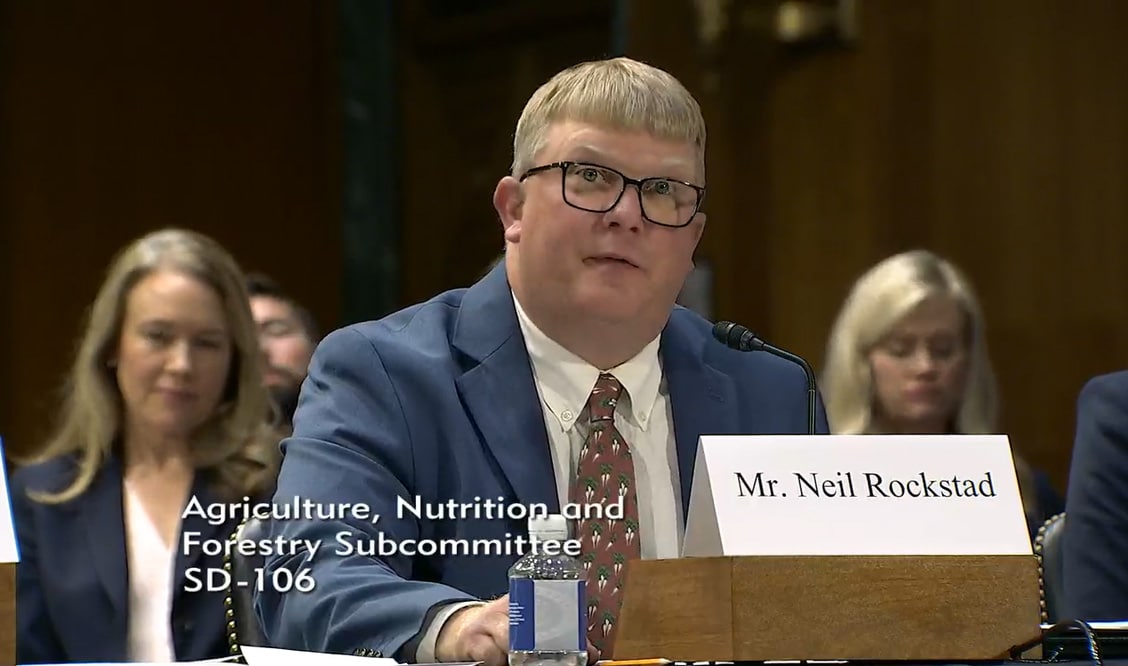
On behalf of the American Sugar Alliance, he thanked Chairwoman Tina Smith (D-MN) and Ranking Member Cindy Hyde-Smith (R-MS) for listening to the needs of American producers as they craft the next Farm Bill.
Rockstad highlighted the strengths of the domestic sugar industry and reiterated the concern shared by all Title I commodities that the safety net needs to be updated to reflect the realities and conditions farmers are facing. “The safety net must be increased in this Farm Bill for long term stability to provide secure supplies for American consumers.”
As Senator Smith noted, farmers are “the center of our economy, our food system, and our national security.” This sentiment was echoed by other members of the committee and the farmers testifying. In addition, Rockstad reminded lawmakers that “Sugar was readily available on grocery store shelves throughout the pandemic. That success is attributable to U.S. sugar policy and the heroic efforts of our farmers and factory workers.”
“Many of the jobs and businesses generated and supported by the U.S. sugar industry are in rural areas and urban areas where good blue-collar jobs have become harder and harder to find. As an industry, we are proud to provide high-paying good jobs in our communities,” said Rockstad. “In my home state of Minnesota, the sugarbeet industry provides almost 21,000 jobs and has a $3.06 billion economic impact.” Sugarbeet farmers are proud to be a part of the $16 billion in value for Minnesota, which Senator Smith spoke about in her opening remarks.
As the committee considers how to write a Farm Bill that is tailored to meet the needs of American farmers, ranchers, and producers in every part of the country, Rockstad urged lawmakers to support the 11,000 American sugarbeet and sugarcane family farmers and the employees in our mills, processors, and refineries.
It bears repeating that “effective sugar policy, which maintains a strong domestic industry, is essential to the food security of our nation.”
PRESS RELEASE: Sugar Farmers Urge Members of Congress to Support American Farmers and Workers for Food Security
FOR IMMEDIATE RELEASE
April 26, 2023
Washington, D.C. – Today, Patrick Frischhertz, a sugarcane grower from Plaquemine, Louisiana testified before the House Subcommittee on General Farm Commodities, Risk Management, and Credit. He thanked Chairman Austin Scott (R-GA-8) and Ranking Member Shontel Brown (D-OH-11) for listening to the needs of American producers as they craft the next Farm Bill.
On behalf of the American Sugar Alliance, Frischhertz called on lawmakers to ensure “Title I sugar policy…provide[s] an adequate economic safety net for American sugarcane and sugarbeet farmers.” Without sugar policy, “we would effectively outsource our sugar supply to heavily-subsidized and unreliable foreign sugar suppliers whose environmental and labor standards simply do not measure up to our own. That would be the opposite of strengthening supply chains and contrary to providing a safety net to American producers. Under that scenario, farmers, consumers, and taxpayers would all lose.”
He reminded the subcommittee of the vital role sugar producers play in the nation’s food supply by ensuring American consumers have “a safe, high-quality, reliable, sustainably produced and affordable supply of an essential ingredient.” He also underscored the effectiveness of U.S. sugar policy that serves Americans at “no cost to the U.S. Treasury.”
Frischhertz spoke on the challenges sugar producers face from high input costs, tight margins, and crop and weather disruptions. He urged the members to examine “how the farm safety net could be updated in the next Farm Bill for all Title I commodities to better match actual operating costs for producers,” and gave sugar producers’ support for the subcommittee’s interest in developing additional risk management programs to complement crop insurance. “We are certainly receptive to new efforts to provide standing disaster coverage in ways that do not undermine crop insurance and possibly even encourage greater participation and coverage levels.”
As this subcommittee considers how to write a Farm Bill that meets the needs of our producers and the American people, Frischhertz urged lawmakers to support the 11,000 American sugarcane and sugarbeet family farmers and the employees in our mills, processors, and refineries.
It bears repeating that “effective sugar policy, which maintains a strong domestic industry, is essential to the food security of our nation.”
How Louisiana Has Sweetened America for Two Centuries
Louisiana farmers are growing sugarcane on some of the same soil their ancestors did more than two centuries ago.
The key to the resilience and success of Louisiana’s 450 cane farming families and 11 raw sugar mills is simple:
“We take care of what Mother Nature has provided,” said Jim Simon, General Manager for the American Sugar Cane League.
For over 100 years, the League strengthened Louisiana’s sugarcane industry through investments in research, student fellowships, and advocacy for the sugar policy that keeps its legacy of family farming alive. Louisiana’s sugarcane farmers and workers support 19,600 jobs and drive $4.23 billion back to the state’s economy.
“We’re very proud of what we do here in Louisiana; the average cane farmer here produces enough sugar to take care of about 125,000 Americans. It’s a quite impressive, important part of our culture, our history, our economy,” Jim said.
“I want my children, if they choose to farm, to have the same opportunities that I had, if not maybe more,” said 6th generation farmer Catherine Floyd.
Her family grows sugarcane on some of the same land in South-Central Louisiana that her ancestors farmed more than 100 years ago. She credits their success in part to their commitment to sustainability.
That commitment is shared by every sugarcane operation in Louisiana. The League actively partners with researchers at the U.S. Department of Agriculture and Louisiana State University (LSU) to find ways to minimize inputs and protect soil health.
“Things that we are doing now for the sustained success of our industry are in turn achieving sustained success of the land that we live on, the continual production of food that we can provide,” said sugarcane farmer and scientist, Brayden Blanchard.
Brayden is studying plant breeding as he works towards his PhD in agronomy at LSU. His work focuses on adjusting current research procedures to develop more cold-tolerant, disease-resistant, and higher-yielding sugarcane varieties so that growers have the tools they need to face a changing climate.
“It’s all data-driven, it’s all science-driven,” Brayden said. “[It’s] geared towards making more with less and providing a more sustainable and productive industry for our growers, and really across the country.”
The American Sugar Cane League’s 100-year history is a testament to the resiliency and strength of our sugar producers, but also the investments that the Louisiana sugarcane industry has made in sustainable research and technology. We can’t wait to see what the next 100 years looks like.
What a Treat! America’s Sugar Farmers Keep Halloween Sweet
This Halloween, Americans are estimated to spend a record $3 billion on Halloween candy for a second year in a row.
Despite the inflationary rise of candy prices, the sugar in it still only accounts for a couple cents per treat. In fact, a recent study by the University of Tennessee confirmed that sugar prices are not the primary driver of candy costs.
The cost of an average candy bar today is $1.69 but the cost of the sugar in it is only roughly $0.02 – that two cents per candy bar has to stretch pretty far to support 151,000 jobs and thousands of family farms across a dozen states.
While American sugar farmers and workers are proud to provide the sweetness in your favorite candies, this year has been no treat for farmers. American sugarbeet and sugarcane farmers have faced down skyrocketing input costs, droughts, freezes, and supply chain complications to bring in a record sugar crop (estimated to be 9 million tons).
 |
“It gets harder each year to stay afloat as a family farm. But we keep our harvest going because we know sugar – real sugar! – is an essential and beloved ingredient for so many celebrations.”
Nate Hultgren, Hultgren Farms in Minnesota |
|
“I’m really proud that the sugar from my harvest makes it into the candy millions of people enjoy on Halloween. But times are tough. Without the support of Americans and Congress, my family farm won’t make it. Who will candy companies turn to when American sugar farmers have been driven out of business?” Todd Landry, a sugarcane grower in Loreauville, LA |
 |
So, this Halloween, remember that it is only thanks to the resilience and dedication of people like Nate and Todd that America’s sweetest industry hasn’t turned into a ghost story…
Celebrate Something Sweet!
Mark your calendars and get ready for a treat, because this week is one to celebrate all things sweet – and the people who make these special days possible!
✓ Today, October 12 is National Farmer’s Day.
✓ Friday, October 14 is National Real Sugar Day.
✓ Saturday, October 15 is National Sweetest Day.
America’s farmers keep our nation fed. That includes America’s 11,000 sugar farmers! Without the hard work and sacrifices of our sugarbeet and sugarcane farmers, and the dedication and skill of the workers who bring the sugar from the farm to your table, America would not have a stable and reliable supply of made-in-America sugar.
 |
Our nation relies on farmers like Chris Payne in Oregon… |
| And fifth-generation grower Shelby Duplantis in Louisiana… |  |
 |
And future sugar farmers, too, like Aleigha Robertson in Idaho. |
By growing the sugar crops that keep American food manufacturing lines humming and our pantries stocked, each of our farmers is making an incredible contribution to America.
That’s why this year, people across the country will also be celebrating American sugar farmers during the first annual National Real Sugar Day on Friday, October 14, to honor the people and sugar crops that sweeten our lives.
Of course, there’s no better way to round out a week of celebrations than by sending a sweet treat to show someone you care on National Sweetest Day on Saturday, October 15.
These sweet celebrations are possible due to the dedication of American sugar farmers and workers. The U.S. sugar industry is crucial to a strong food supply chain, our national food security, and to supporting communities across the country with more than 151,000 jobs.
Congress’ continued bipartisan support for a strong and robust U.S. sugar policy ensures that America is not at the whims of unreliable foreign suppliers for an essential food ingredient.
So, this week, don’t forget to celebrate something sweet – and while you’re at it, thank a farmer, too!
New Study Finds Big Candy Posting Big Profits
Life is sweet and profits are up for American confectioners, in part due to the reliability of America’s sugarbeet and sugarcane growers and the stability provided by U.S. sugar policy.
A new study by the University of Tennessee did the math on candy profits: Over the past 10 years, candy corporations posted high profits and a nearly double the return on investment compared to an average publicly traded U.S. firm.
In addition to big profits, Big Candy is projecting big growth. The National Confectioners Association projects that U.S. confectionary sales will reach $44.9 billion by 2026, a more than 20% increase from 2021’s $36.9 billion in sales.
“It’s insulting that multi-billion-dollar corporations are posting high profits while crying poor to Congress as they try to dismantle the policy that protects my farm,” said Nate Hultgren, a sugarbeet grower in Minnesota and President of the American Sugarbeet Growers Association. “Family farms like ours across the nation work hard to provide candy and other food companies with sugar, sometimes working 24 hours a day to get the job done. Farming is volatile, unpredictable, and expensive. Farmers are essential to the nation’s food security.”
The study analyzed the profits and risk of several major sugar-using firms and compared their financial returns and risk metrics to other agri-businesses and a benchmark of all U.S. firms. The high profitability and low volatility of the industry can be attributed, in part, to U.S. sugar policy, which provides a reliable supply of domestically produced sugar and the flexibility to ensure that supply always meets demand.
Findings include:
- The median return on investment for sugar-using firms over the past 10 years was nearly double that of all firms (11.3% vs. 6.1%) and almost double compared to other agribusiness companies (11.3% vs. 6.6%).
- Over the past 20 years, sugar prices in the U.S. have been more stable than sugar prices in the volatile world dump market.
“Big Candy says that purchasing American-made sugar is a financial burden and they need unlimited cheap foreign sugar to survive, but that’s just not true. Just look at their profits! If our critics were successful in weakening the current sugar policy, my farm might not survive. Who will candy companies turn to when American sugar farmers have been driven out of business?” said Bryan Simon, a sugarcane grower in Abbeville, LA.
U.S. sugar policy supports U.S. farmers by providing loans to store sugar, which are repaid with interest, and leveling the playing field for American producers while providing preferential market access to nearly 40 countries. The U.S. is the third largest importer of sugar in the world. U.S. sugar policy is authorized in the Farm Bill and is designed to cost taxpayers nothing.
Senate Communicator Joins American Sugar Alliance as Director of Communications
Today, the American Sugar Alliance (ASA) announced Lillie Zeng as its new Director of Communications.
Ms. Zeng was most recently Press Secretary for Senator Debbie Stabenow (D-MI), Chairwoman of the Senate Committee on Agriculture, Nutrition, and Forestry. Prior to her time on the Hill, Ms. Zeng spent a decade at the Department of Agriculture where she held various roles as a public policy expert and strategic communications advisor for marketing and regulatory programs. She received her undergraduate degree from New York University and her graduate degree from Georgetown University, and grew up around agriculture in the “salad bowl” of the United States – Salinas, CA.
“We are so excited to have Lillie join the sugar family,” said Ryan Weston, ASA’s chairman. “American’s sugar producers are essential in order to provide a key ingredient for our food supply. As Director of Communications, Lillie will help us elevate the stories of our hardworking sugar farmers that provide food security for our nation and ensure their voices are heard in Washington.”
Sugarbeet Scientist Testifies on Sustainability Advances in Conventional Agriculture
Conventional agriculture has paved the way for farmers to make rapid advancements in protecting and promoting soil health, Dr. Rebecca Larson, Chief Scientist for the Western Sugar Cooperative, testified before the House Agriculture Committee, today. “The evolution of conventional ag practices has reduced soil erosion by 35% across the U.S.,” Dr. Larson told Congress. “Soil health is critical for farmers. It reduces crop inputs, increases crop productivity, and instills resiliency in the agroecosystem.”
Dr. Larson expounded upon data collected from the 800 small family farmer-owners who farm sugarbeets and collectively own the Western Sugar Cooperative. In order to ensure soil health and sustainably grow sugar, Western Sugar Cooperative growers focus on:
- Conservation tillage: Most Western Sugar Cooperative growers use conservation tillage, improving microbial diversity and adding other environmental benefits.
- Cover crops: Fall-seeded cover crops, spring-planted rye, and the previous year’s crop residue are all used by Western Sugar Cooperative growers, depending on each grower’s circumstances, to protect their soil.
- Conservation crop rotation: All Western Sugar Cooperative growers engage in conservation crop rotation to balance nutrient demands and protect biodiversity.
- Genetically engineered sugarbeets: All of the U.S. sugarbeet crop is genetically modified, requiring less tillage and fewer pesticide applications.
Armed with these tools, sugarbeet farmers in the Western Sugar Cooperative have reduced erosion by 90%, reduced pesticide usage by 40%, reduced fuel consumption and greenhouse gas emissions by 40%, and increased water use efficiency by 30%. Importantly, farmers have increased yield from 8,000 to more than 11,000 pounds of sugar per acre, an achievement that Dr. Larson called “true sustainable intensification.”
The U.S. sugar industry has preserved our natural resources, family farms, and rural communities for generations to come. Overall, U.S. sugar farmers produce 16% more sugar on 11% less land than they did 20 years ago.
As Congress considers the next Farm Bill, Dr. Larson urged members to “invest in outcome-based solutions that keep the farmer in the driver’s seat, as they understand the nuance of their production system.” As dedicated stewards of the land, U.S. sugar producers continue to advocate for voluntary climate-smart policies that allow farmers to achieve their climate goals.
Learn more about how Western Sugar Cooperative and the entire U.S. sugar industry is executing on its commitment to produce Sugar Sustainably.
Key Senators Urge USDA to Support Sugar Policy, U.S. Sugar Producers Praise Bipartisan Letter
Key U.S. senators urged U.S. Department of Agriculture (USDA) Secretary Tom Vilsack to “reject proposals that would weaken U.S. sugar policy and jeopardize our nation’s food security,” in a letter sent Friday. The bipartisan letter was led by Sen. John Hoeven (R-N.D.) and signed by a total of 12 senators, including Sen. Debbie Stabenow (D-MI), Chairwoman of the Senate Agriculture Committee.
Backed by a strong U.S. sugar policy, America’s sugar farmers and workers help provide the U.S. with an ample supply of high-quality, affordable sugar, grown and produced under some of the world’s most rigorous environmental and labor standards.
“For decades, sugar supplies have met domestic demand through sugarbeet and sugarcane production and imported raw and refined supplies. U.S. processors and refiners maintain stocks on hand to meet demands, and to ensure that carryover stocks are adequate during sugarbeet and sugarcane harvests,” the senators wrote. “According to the U.S. Department of Agriculture’s own measures, today, the U.S. sugar market is adequately supplied.”
The senators also praised the resiliency of the U.S. sugar industry, noting that “[rising] input costs, especially for fertilizer and diesel fuel, along with a labor shortage in the transportation industry, have significantly increased the cost of production for our sugar growers. Despite these current challenges, thanks to U.S. sugar policy, our sugar supply chain remains resilient and in a strong position to address future challenges.”
Sugarbeet growers Jeff Olson of Colfax, ND, and Rick Gerstenberger of Snover, MI, and sugarcane growers Ardis Hammock of Moore Haven, FL, and Gary Gravois of Napoleonville, LA, thanked the senators for their ongoing support for family farmers.
“We are grateful for the leadership of Senator Hoeven, Chairwoman Stabenow, and their colleagues, in standing up for farmers and our food security. We are proud to grow America’s sugar crops and play an essential role in maintaining a robust Made-in-America food supply. After a challenging year on many of our farms, we can head into harvest confident in knowing that U.S. sugar policy has strong bipartisan support.”
A recent op-ed authored by North Dakota sugarbeet farmer Jason Schatzke and Texas sugarcane farmer Lance Neuhaus detailed how increasing costs and efforts to undermine U.S. sugar policy threaten their farms and our nation’s food security. U.S. sugar policy supports family farms and more than 151,000 jobs across the country and is designed to cost taxpayers nothing.
USDA Under Secretary: Opportunity for U.S. Agriculture to be Hero on Climate Change
America’s farmers have an opportunity to be “a real hero in our ability to address climate change” through improvements in productivity and climate-smart practices, but a successful climate program “has to work for agriculture.”
That was the message shared by Robert Bonnie, Under Secretary for Farm Production and Conservation (FPAC) for the U.S. Department of Agriculture (USDA), at the 37th International Sweetener Symposium yesterday.
Bonnie outlined USDA’s approach to addressing climate change through building broad, collaborative partnerships across agriculture.
“There’s so much diversity in agriculture,” Bonnie said, “that the approach to climate change can’t be one that dictates practices for low and high. It has to be modern. It has to be producer-led. It has to allow farmers, ranchers, and forest landowners to choose which practices work best for them, and then provides incentives for them to do that.”
Initiatives to reduce greenhouse gas emissions must recognize the critical role American farmers play in producing a global supply of food and fiber.
“We have to reduce emissions even while we maintain and enhance productivity. We’ve got to feed 9.5 plus billion people in the world by the middle of the century,” Bonnie explained. “U.S. agriculture is really good at productivity, and it’s really good at efficiency. That’s why I’m optimistic about the ability of U.S. farmers and U.S. forest land owners to be able to address climate change.”
Thanks in part to strong federal farm policies, U.S. sugarcane and sugarbeet farmers continually invest in new research, technologies, and techniques to boost efficiency and protect our planet. U.S. sugar farmers produce 16 percent more sugar today on 11 percent less land compared to 20 years ago – and they’ve increased yield per acre by 30 percent while using fewer inputs.
U.S. sugar producers continue to expand on this work and, as part of the Food and Agriculture Climate Alliance (FACA), support voluntary and incentive-based conservation programs that promote resilience in rural communities.
Uncertainty in the farm economy has presented new risks for U.S. sugar producers. In addition to farm and trade policies that help level the global playing field, U.S. sugar farmers and workers need the Farm Bill to provide a strong safety net and affordable risk management tools.
Bonnie emphasized the importance of crop insurance as a risk management tool, saying, “crop insurance is critically important for so many folks in agriculture.” He noted that there are ways to increase crop insurance accessibility while improving the products available to farmers.
U.S. sugar producers are committed to a more sustainable future. A strong Farm Bill that preserves sound U.S. sugar policy and addresses the increased challenges facing farm producers will further this mission while protecting U.S. food production, preserving good American jobs, and supporting the local communities who rely on a vibrant U.S. sugar industry.
Investing in Sugar’s Future
America’s sugar farming families and workers are building a brighter future through investments both in sugar crops and the talent needed to produce this essential ingredient.
The grower-owned Minn-Dak Farmers Cooperative in Wahpeton, North Dakota, is committed to producing sugar sustainably.
Mike Metzger, Vice President of Agriculture and Research, works alongside his team to give Minn-Dak’s farmers the tools they need to grow the best possible crop. Healthier plants more efficiently harness the power of the sun to create sugar.
One recent development that has helped farmers raise healthier beets are seeds coated with targeted disease and pest control treatments.
“We always say, the hope of the harvest starts with the seed,” Mike shared. “[With] seed treatments, we’re able to deliver a very specific amount of product that’s very active on our pest, that’s in the zone where we want it, while not hurting the seed. It’s been a very great thing.”
This has a major downstream impact. It reduces the need for insecticide applications and results in a healthier sugarbeet, lowering the respiration of beets in storage, increasing sugar, improving efficiencies in processing, and supporting the economic viability of growers.
“Sustainability to me, as an agronomist for sugarbeets, is really the documentation of practices that have been in existence for years. You don’t get to be a 4th generation sugarbeet farm and be successful unless you’re being incredible stewards of the land,” Mike said.
Another way Minn-Dak is showing its commitment to a sustainable future is by investing in its workforce.
Emily Skaare began her career at Minn-Dak as a college intern. She is now a process engineer and part of the team that keeps the co-op running smoothly.
Emily’s work at Minn-Dak includes finding new ways to increase efficiency and become more sustainable. For example, the co-op is working to create more sugar while using fewer resources by recovering waste heat. The co-op captures the heat from hot water that needs to be cooled and then uses it in another part of the process that requires warm water.
Sustainability is consistently top of mind for Emily. “How are we protecting the earth, land, and the resources for the generations ahead of us?” she said. “Are we using appropriately and are we saving appropriately?”
Emily also hopes that her role at Minn-Dak serves as inspiration to others interested in the sugar industry. “It’s good for people to see that this job can be for anybody,” she said.
Check out some more of the sweet ways our sugar producers are helping to create a more sustainable future by viewing our Sugar Sustainably series on YouTube.
America’s Sweetest Industry Supports 151,000 Jobs, $23 Billion Economic Impact
America’s sugar farming families and workers support more than 151,000 jobs across more than two dozen states and contribute more than $23 billion to the economy each year, according to a new study from the Agricultural and Food Policy Center at Texas A&M University. This study highlights America’s sweetest industry, underscoring the critical importance of maintaining domestic sugar production by supporting strong farm and trade policies.
“Sugar is a fundamental building block of the food we eat, and sugar production provides good paying jobs and local support that make it the backbone of many communities throughout the United States,” said Dr. Rob Johansson, Director of Economics and Policy Analysis for the American Sugar Alliance. “This report demonstrates how U.S. sugar policy supports America’s sugar farmers and workers, allowing them to maintain a safe, reliable, and affordable supply of sugar that touches all of us.”
The study, titled “Economic Impact of the U.S. Sugar Industry,” is authored by renowned agricultural economists Dr. Bart Fischer and Dr. Joe Outlaw. Drs. Fischer and Outlaw analyzed production levels and prices for the sugarcane and sugarbeet industries and profiled six growing regions to illustrate the ground-level impact of the industry.
Among the report’s findings:
- Sugar production in America has an annual economic impact of $23.3 billion.
- The sugar industry supports 151,238 direct and indirect jobs, an increase since a 2009 analysis. However, since 2009, several sugar producers have been driven out of business by increasing costs and relatively flat prices.
- Wages and benefits associated with these jobs total $5.7 billion annually, an increase of 37 percent from the 2009 report.
- Efficiency gains have increased production by 13 percent.
State-by-state and crop-specific results are available in the full report.
“America’s sugar producers remain some of the most efficient in the world and are executing on their commitment to produce sugar sustainably,” Johansson said. “In addition to helping keep us fed, the opportunities and well-paying jobs provided by the sugar industry drive the economy in both small towns and urban centers across America. This is a testimony to the stability and certainty provided by U.S. sugar policy – without costing taxpayers a cent.”
The Texas A&M report comes as Congress begins debating the 2023 Farm Bill and as American sugarcane and sugarbeet farmers, like the rest of agriculture, face increasing pressures from rising input costs.
“Rising input costs and shrinking production margins on our farms and in our factories pose a dire threat to the future of America’s sugar industry. Our family farmers are resilient, but they need sound federal farm policies to ensure that America isn’t left dependent on unreliable foreign producers for a critical food ingredient.”
America’s sugar producers encourage Congress to support this essential domestic industry by maintaining a strong sugar policy in the 2023 Farm Bill.
Letter on Alexis Taylor’s Nomination to Under Secretary for Trade and Foreign Agricultural Affairs
The American Sugar Alliance (ASA) sent a letter to U.S. Senate leadership expressing deep support for the nomination of Alexis Taylor to serve as the U.S. Department of Agriculture’s (USDA) Under Secretary for Trade and Foreign Agricultural Affairs. ASA urges the U.S. Senate to swiftly consider and confirm Director Taylor. In our current uncertain global climate, having an Under Secretary for Trade and Foreign Agricultural Affairs as qualified and knowledgeable as Taylor will be invaluable to all of American agriculture.
Preparing the Next Generation of Sugar Growers
Sugar farmers grow far more than beets and cane. They are also growing the minds of tomorrow’s sugar producers through programs like the Amalgamated Sugar’s Youth Sugarbeet Grower Program.
Amalgamated Sugar Company, a grower-owned beet sugar cooperative headquartered in Idaho, began its Youth Sugarbeet Grower Program to invest in young farmers and ensure the industry is sustainable for future generations. The program provides hands-on experience with sugarbeet farming, giving participants the opportunity to raise two shares of sugarbeets on their family farm and requiring a presentation on a research topic of their choice.
High school student Aleigha Robertson farms with her family in Paul, Idaho. Aleigha has worked to raise sugarbeets while researching topics such as cover crops.
Her participation in the Youth Sugarbeet Grower Program has taught her new skills and strengthened her advocacy for sustainable farming practices. 
Her mom, Mindy, has helped her along the way. “Every good farm kid should know how to pick rock, move hand lines, drive truck, be involved in what we do and it’s important for me to teach my kids to work and to be involved in our farm and grow to love it,” Mindy said.
America’s sugar farmers, like the Robertsons, continue to invest in ways to produce sugar more sustainably. On their farm, the Robertsons have made gains with efficiency and sustainability while improving yields. They have gone from harvesting 13 tons of sugarbeets per acre decades ago to 40 tons per acre today.
“My dad has done a great job about keeping the land, being able to harvest it and use it over and over,” Aleigha added. “And then that just means my siblings, if any of us want to come back, it’s here for us and we can use it.”
Check out some more of the sweet ways our sugar producers are helping to create a more sustainable future by viewing our Sugar Sustainably series on YouTube.
Producing Sugar Sustainably on Earth Day, and Every Day
Earth Day is a day to celebrate our planet and bring awareness to the part that we all play in making the world a more sustainable place.
As stewards of the land, sugar farmers have been investing in a healthier planet for generations. They’re protecting the land that helps feed us and working to pass the American legacy of farming to the next generation.
For America’s sugar farmers and workers, producing sugar sustainably means creating a brighter future for us all. That’s why our producers are working to reduce greenhouse gas emissions, improve water and soil quality, and sequester carbon. Over the past 20 years, we’ve vastly increased productivity, producing 16 percent more sugar on 11 percent less land while reducing inputs.
Through our Sugar Sustainably series, we’ve been able to document some of the ways sugar producers are continuously investing in our planet and producing America’s sweetest crop with future generations in mind. Check out a selection of stories below and view the full playlist of Sugar Sustainably stories on YouTube.
- Targeted application of nitrogen helps spur crop production, but it’s important to only use as much as you need. Sugarcane farmers like Keith Dugas are working with researchers to test new technologies to apply precise amounts of what a crop needs, like nitrogen, and only when they need it. This practice better protects the environment.
- Over in Colorado, fourth-generation sugarbeet farmer Paul Schlagel is working to make his farm more sustainable. The Schlagel farm uses strip tilling to prepare the ground for seed, reducing the amount of carbon released back into the air which helps to improve air quality.
- RaNae Isaak is an engineer at Cummins who grew up on a sugarbeet farm and has helped design more efficient tractor engine systems that are used on sustainable farms all over the U.S. Thanks to agricultural innovators like RaNae, tractors are now able to harvest 100 acres with the same emissions used to harvest just one acre in 1997.
- In addition to sugar, our producers supply several co-products that have multiple uses – including use as a renewable biofuel! Many sugarcane processors, for example, fuel their boilers using bagasse, which is the fiber leftover from extracting the sugar from the cane. By using bagasse, the companies take what would be waste and turn it into an energy source.
We should all be encouraged to look at ways to invest in our planet to create a brighter future. America’s sweetest industry is proud to do our part by prioritizing people, protecting the planet, producing superior products, and promoting fair-price policies.
Happy Earth Day!
Dr. Johansson: Sugar Forecasts and the Farm Safety Net
Column authored by Dr. Robert Johansson, Associate Director of Economics and Policy Analysis at the American Sugar Alliance.
The vernal equinox, aka spring equinox, came and went Sunday, March 20, marking the end of winter and the beginning of spring.
As all good aggies know, that means the economists at the Food and Agricultural Policy Institute (FAPRI) at the University of Missouri have just published their new 10-year baseline for agricultural production and programs.
That baseline is adjusted by University of Missouri economists to reflect more recent 2022 prices and economic conditions compared to the earlier U.S. Department of Agriculture (USDA) baseline published in part in November and in full in February. Most of the data and assumptions used for these projections came from the January time frame, however. That means that a lot of the impacts one might expect from the conflict between Russia and Ukraine and disruptions with Black Sea deliveries will not be reflected in this baseline.
For example, while fertilizer prices are assumed higher for 2022/23 in this baseline compared to the 2021/22 crop year, the extreme rise in fertilizer prices since the conflict began and the likelihood that Russia and Belarus will have continuing difficulties with exporting goods are not captured in this report. As another example, this baseline does not include the projected increases in interest rates announced by the Federal Reserve Open Market Committee in March.
From a sugar perspective, the equinox also marks the tail end of the sugarcane harvest (with some acres left to harvest yet in Florida and Texas) and the beginning of sugarbeet planting.
Taking stock:
- we expect record domestic sugar production at 9.4 million tons in 2021/22, despite challenges ranging from historic drought in the Northern Great Plains to hurricanes battering the Gulf Coast shores and a freeze in Florida this January; and
- the projections for next year are for a continued increase in production to more than 9.7 million tons in 2022/23.
With record production for American sugar farmers this year and next, there will be more than an adequate supply of sugar to fulfill our nation’s needs. Projected imports for this year and next are expected to continue to decline from the recent high of 4.2 million tons in 2019/20.
Looking forward, FAPRI expects overall sugar demand to grow by nearly 1 million tons over the next 10 years, as the number of people in America grows over time. Per capita consumption of sugar has been relatively flat over the recent 10-year period, while consumption of high fructose corn syrup has been falling.
Sugar demand growth is met with expected growth in domestic production, but U.S. sugar policy also gives 41 countries, most of them developing nations, preferential access to our market to ensure that consumers always stay stocked with this essential ingredient. In fact, the U.S. is the third largest sugar importer in the world. Overall stocks-to-use remain near 14.5%, indicating ample stocks of sugar are projected to be available on average over the projection period.
While FAPRI does not explicitly discuss government program costs for sugar, USDA in their 10-year baseline continues to project a sugar program cost of $0 over the next 10 years. And in the FAPRI baseline with rising production in the U.S., sugar prices for raw cane sugar and refined beet sugar are expected on average to remain above the loan rates.
However, with any good economic forecast there are both positives and negatives. An area worth keeping an eye on is rising costs of production. Both FAPRI and USDA expect agricultural costs of production to continue to increase over the next 10 years. FAPRI has input costs rising by 24% and USDA has input costs rising by 8% over the baseline period, which again does not include any developments from February or March. FAPRI projects the farm debt-to-asset ratio creeping up to 15.7% by 2031 (which would be the highest since 1989 if realized), reflecting rising costs of production and stagnant prices for outputs.
In the face of such anticipated challenges, it is critical that Congress continue to back a strong farm safety net including a no-cost sugar policy in order to allow continued investments in farm productivity and refining efficiencies.
Farmers Stand on the Front Lines of Food Security
National Agriculture Day is an annual day to celebrate the American farmer. In America, we spend a smaller proportion of our household income on food than any other developed country. A safe, affordable food supply with amazing variety and unequaled distribution is something to celebrate.
However, as farmers prepare for spring planting this year, the mood across agriculture is far from celebratory. Skyrocketing input costs are putting the squeeze on already tight farm budgets, debts relative to assets are rising, and the cost of credit is going up, leaving farmers uncertain about the future and consumers wary of the rising costs of food.
Our farmers are standing on the front lines of food security. America’s farm policies must reflect this reality.
The farm families who grow sugarcane and sugarbeets are a critical part of the American food supply. Thanks to our farmers and processors, mills, and refineries, these crops are turned into a ready supply of sugar. More than 60 different kinds of sugar, including powdered sugar, brown sugar, various granular sizes and many other types of sugar, keep food manufacturing lines humming and home pantries stocked with just-in-time deliveries to food companies and grocery stores.
Growing sugar certainly takes hard work and requires major expenses. For example, even using today’s most advanced conservation techologies, we need fuel to power our tractors and fertilizer to nurture our crops.
Just like most Americans, farmers are feeling the pain at the gas pump. A diesel-powered tractor might require five gallons of fuel just to prepare and plant seed on one acre. With diesel above $5 a gallon, a farmer planting 1,000 acres is looking at a $26,000 bill for fuel costs alone, up $10,000 from just last March. It will cost a lot more to care for and harvest the crop this fall.
Fertilizer prices are also soaring, with some fertilizer components increasing in cost by triple digits. Our farmers are being crushed by these unsustainable costs. Increased costs of production are one reason why the U.S. Department of Agriculture forecasts a 7.9 percent drop in farm income for 2022.
As the world watched Russia’s invasion of Ukraine in horror, the war sent shockwaves through these already tenuous fuel and fertilizer supply chains. Countries like Ukraine, Algeria, Moldova, and even Russia, have acted quickly to protect their domestic food supplies by banning the export of sugar and other essential goods. Across the globe, Brazil is expected to divert more of its sugarcane production to ethanol in response to rising oil prices.
The world’s sugar market was already the world’s most volatile commodity market. Now, this famously dysfunctional market is even more uncertain and unstable. This crisis has underscored the importance of supporting our sugar farmers to ensure that America is not overly dependent on unreliable foreign suppliers for sugar. We already depend on foreign suppliers for about 30 percent of our needs.
Unfortunately, the price of sugar does not reflect either sugar’s importance as an essential ingredient or the incredible challenges facing America’s sugar farmers as they work to improve productivity while meeting some of the highest labor and environmental standards in the world. Domestic sugar prices have remained relatively flat over the past 40 years. In fact, U.S. sugar prices have fallen in real terms when accounting for inflation.
Our farmers are proud to help feed America. But this year, many of them might be wondering how they will be able to pass their farm to the next generation.
America’s farm and trade policies must continue to reflect the integral role that farmers play in securing our food supply and ultimately, the role they play in our national security. That’s the best thanks we can give our farmers this National Agriculture Day.
Sugar: A Strong Supply Chain
In early 2020, America faced the beginning of a global pandemic. Historically robust supply chains were tested, forcing ships to wait in line at port and leaving grocery store shelves sparsely stocked. However, our industry kept America reliably supplied with sugar, an essential food ingredient.
This was largely due to the strong farm and trade policies that have supported America’s sugar growers and processors and allowed our industry to invest in a robust domestic industry and an extensive storage and delivery network.
Today, there are more than 90 strategically located sugar factories, mills, refineries, and storage facilities in the U.S. that provide for customer needs and just-in-time delivery across the nation, making the sugar industry critical to our national food security.
Congressional support for this vital American industry is through legislation known as the Farm Bill, which includes sugar policy, designed to cost taxpayers $0 and to keep sugar affordable and reliably available. Sugarbeet and sugarcane growers are meeting virtually with congressional offices this week to talk about the importance of this policy as they ramp up to reauthorize the Farm Bill in 2023.
Here’s how it works: The seasonal nature of sugarbeet and sugarcane crops requires sugar producers to store massive amounts of sugar until the market wants it. The sugar extracted from these crops is stored at the expense of sugar producers. The Farm Bill authorizes the U. S. Department of Agriculture (USDA) to offer loans to America’s sugar producers so farmers can pay their bills while their sugar is being stored for their customers. Once the customers take delivery and pay producers for the sugar, the storage loans can be repaid to USDA with interest.
“The sugar provision in the Farm Bill doesn’t cost the taxpayer anything, but it’s an essential safety net for us,” said Ervin Schlemmer, a sugarbeet farmer in Montana.
At the same time, our existing trade commitments provide 41 countries with guaranteed preferential market access to the U.S., making America the 3rd largest sugar importer in the world. Combined with domestic sugar production, this ensures that American consumers and food manufacturers always have sugar available.
If current sugar and trade policies were weakened or eliminated, our market would be flooded with imported sugar that is heavily subsidized and less sustainably produced, driving American farmers and workers out of business. And as a result, our country would be dependent on unreliable and uncertain foreign suppliers.
“I need a strong Farm Bill that stops foreign governments from having a yard sale of their heavily subsidized sugar here in the United States and I need a government to say we want our food produced in America,” said Ardis Hammock, a sugarcane grower in Florida.
We’re proud to help feed America, and glad that Congress has continued to support the sugar farmers and workers who keep America sweet.
National Farmers Union Supports No-Cost Sugar Policy
One of the nation’s leading advocates for family farmers, ranchers, and rural communities renewed its support for a no-cost U.S. sugar policy that creates a level playing field for sugar producers while ensuring a safe, reliable, and affordable supply of sugar for consumers.
National Farmers Union (NFU), which works on behalf of nearly 200,000 American farm families and their communities, issued its policy resolution in support of U.S. sugar policy at its 120th anniversary convention in Denver. The convention brought together NFU members, industry professionals, policymakers, and reporters.
The major components of NFU’s policy resolution include:
- Continuation of the no-cost U.S. sugar program and encouraging Congress to work with U.S. sugar producers to adopt a strong sugar program in future Farm Bills
- Continuation of the suspension agreements governing sugar trade with Mexico
- Opposition to ethanol produced from imported sugar receiving any taxpayer subsidies
NFU has been a long-time supporter of no-cost U.S. sugar policy, voicing its support during debates over the 2018 Farm Bill.
The Farm Bill authorizes the U.S. Department of Agriculture to offer loans on domestically produced sugar that is being stored for customers until they need and pay for it. These loans help farmers cover their production expenses. The loans are repaid to USDA with interest and there are no subsidy checks, meaning that the policy is designed to operate at no cost to taxpayers.
Importantly, U.S. sugar policy gives America’s sugar producers the stability they need to invest in more efficient and sustainable farming operations, preserving multi-generational family farms and strengthening the rural economy.
“The importance of National Farmers Union’s ongoing support for no-cost U.S. sugar policy cannot be overstated,” said Luther Markwart, chairman of the American Sugar Alliance. “NFU has a strong history of working with and advocating for farm families and rural communities, which are the backbone of our country and our sugar producing members. We look forward to partnering with NFU and others as we advocate for America’s sugar producers in the 2023 Farm Bill.”
American Sugar Alliance Testifies on Importance of Farmers, Farm Bill
Dr. Rob Johansson, Director of Economics and Policy Analysis at the American Sugar Alliance (ASA), testified before the House Committee on Agriculture today on the importance of supporting America’s sugar farmers, producers, and sugar supply chain by maintaining a strong U.S. sugar policy in the 2023 Farm Bill.
In his written testimony, Johansson outlined the strategic importance of American sugar production. The U.S. sugar industry generates more than 140,000 jobs and $20 billion in annual economic activity. In short, the U.S. sugar industry serves as the backbone of local economies in both rural and urban regions while keeping America supplied with an essential ingredient.
Over the past two years, Johansson pointed out, problems with global supply chains have made clear the danger of relying on uncertain foreign suppliers. “This is why an effective sugar policy, which maintains a strong domestic industry, is essential to the food security of our nation,” Johansson said.
Johansson thanked lawmakers for their bipartisan support of U.S. sugar policy, which, because it is based on loans repaid with interest, is designed to cost taxpayers nothing. This structure ensures U.S. sugar policy serves American farmers, consumers, food manufacturers, and taxpayers alike.
However, much like other agricultural sectors, sugar producers are feeling the pressure of rising production costs and inflation while loan rates for raw cane sugar and refined beet sugar have not kept pace. Johansson urged lawmakers to examine how the farm safety net could be updated to better reflect actual costs.
“Operating margins are being squeezed each year, due to rising labor, fuel, seed, fertilizer, equipment and interest rate costs that hit our producers in the field and at the factories they own. Having a loan rate that is closer to actual costs of production would provide a more effective safety net to our producers,” Johansson said.
Other farm safety net programs, such as crop insurance, are important for America’s sugar farmers, and could be improved upon to better meet the unique risk management needs of sugar crops.
Johansson also explained how farm and trade policies, and the strong enforcement measures put into place to uphold these policies, prevent our market from being flooded by heavily subsidized foreign sugar imported from the volatile world market. This sugar is normally sold well below the cost of production and is not produced under the same high standards as U.S.-made sugar.
“Our industry proudly meets some of the highest labor and environmental standards in the world, unlike many other large sugar producing countries. Moreover, using best practices and continuous improvement, our sector has made huge strides in sustainability,” Johansson said.
Johansson concluded his testimony by inviting lawmakers to visit sugar farms and processors throughout the country to see first-hand how U.S. sugar policy and the Farm Bill support America’s sugar farming families and workers, and the communities where they live and work.
Sugar: America’s Sweetest Industry
America’s sugarbeet and sugarcane growers are gearing up for virtual meetings to share with congressional offices the importance of the no-cost sugar policy that keeps households and food manufacturers supplied with an essential food ingredient – made right here in America.
While these sugar growers will be sharing their perspective from the farm, the sugar industry plays an important role in strengthening America’s rural economy.
“Growing sugarcane keeps our community alive and viable. We put a lot of money into our local communities and our state economy,” said Gert Hawkins, a sugarcane grower in Louisiana.
 |
| Nate Hultgren and his family, sugarbeet growers in Minnesota. |
Nate Hultgren, a sugarbeet grower in Minnesota and President of the American Sugarbeet Growers Association, echoed, “My message to Congress would be to think about independent small businesses in our rural communities, not just farmers.
The American sugar industry:
- Employs 142,000 hardworking men and women,
- Contributes $20 billion annually to the U.S. economy,
- Consists of sugar companies that are either farmer-owned cooperatives, employee-owned, or family-owned businesses, and
- Supports good jobs in both urban and rural communities with $4.2 billion in annual wages and benefits.
 |
| Julie Serbus, a sugarbeet factory technician in Minnesota. |
The sugar industry is vital to the communities where we all live and work. Beyond providing well-paying jobs, America’s sugar producers contribute to local charities and support educational opportunities, strengthening the social well-being of our neighborhoods.
“It’s incredible to see the impact that sugar has on our community. It also gives you a real sense of pride, seeing the crops we process become the sugar in your grocery cart,” said Julie Serbus, a sugarbeet factory technician in Minnesota.
The sugarbeet and sugarcane crops grown by our family farmers are processed into high-quality sugar, keeping the country supplied with an affordable and sustainably produced ingredient.
 |
| Coco Sonnier, a sugarcane engineer and chemist in Louisiana. |
Much like our farmers, our sugar workers are a critical part of sugar’s story. Coco Sonnier is the 5th generation of her family working in the Louisiana sugar industry and she calls it “the sweetest industry the state has to offer.”
“Coming from a farming family and now working on the processing side at the mill, the sugar industry comes full circle. I understand the importance of growers and processors working together for one common goal – sugar,” Coco said.
We look forward to sharing more about our vibrant industry with Congress and appreciate the bipartisan support for a strong sugar policy that supports American farmers, American jobs and American communities.
Former USDA Chief Economist: Sugar Policy Supports Farmers, Food Security
U.S. sugar producers keep America reliably stocked with affordable sugar, thanks to the stability provided by U.S. sugar policy, said Dr. Rob Johansson, Director of Economics and Policy Analysis at the American Sugar Alliance (ASA), in remarks at today’s Agricultural Outlook Forum, hosted by the U.S. Department of Agriculture (USDA).
Johansson, who served at USDA for 21 years, including most recently a six-year post as USDA’s Chief Economist, spoke to the pressures facing farmers and emphasized that sugar producers are not immune to these challenges.
Rising prices for fertilizer, feed, labor, fuel, pesticides, and transportation have put the squeeze on farmers, tightening their already thin margins. Fertilizer prices, in particular, have risen significantly this past year, with some individual fertilizer components posting triple digit increases. Increased costs of production are one reason why the UDSA has forecasted a 4.5% drop in net farm income for 2022, when compared to last year. And when accounting for inflation, net farm income is forecast to fall by nearly 8% compared to last year.
“With inflation affecting most sectors of the economy this year as well as continued declines in government assistance for pandemic relief, we can expect farmers to be concerned about their bottom-line heading into the 2022/23 crop year,” Johansson said before giving his presentation.
While input costs continue to rise, sugar prices have generally fallen in real terms when accounting for inflation, despite being an essential ingredient in many foods.
“Refined sugar prices have fallen by 35 percent in real terms over the past 40 years,” Johansson said.
U.S. sugar policy has allowed America’s sugar producers to invest in on-farm and factory improvements to become even more efficient and more sustainable. Per acre yields for sugarbeet and sugarcane have both sharply increased over the past 20 years, with the industry overall producing 16 percent more sugar on 11 percent less land.
Still, America’s sugar producers and our American-made supply of sugar are under threat from both growing economic pressures and efforts to undermine America’s successful sugar policy.
Johansson underscored the importance of maintaining a strong sugar policy as Congress begins deliberating the 2023 Farm Bill. U.S. sugar policy protects family farms and good American jobs, and rural and urban communities, while supporting our national food security by providing a stable supply chain, all at no cost to taxpayers.
“Another benefit of U.S. sugar policy is the development of resilient supply chains for America’s sugar supplies,” Johansson said. “We have seen throughout the pandemic how our sugar companies were able to quickly redirect sugar supplies to where they were needed. Maintaining our current program that allows our farmers to harvest, refine, and store sugar until it is needed is a key component of that resilient supply chain.”
U.S. Sugar Producers Propose WTO Reforms to Improve Transparency, Accountability
The World Trade Organization (WTO) announced earlier this week that trade ministers and negotiators from around the globe will convene the week of June 13 for its 12th Ministerial Conference. In support of these important negotiating efforts, the American Sugar Alliance (ASA) released a new policy statement outlining four recommendations to improve the international trade body’s effectiveness.
WTO reforms will make dismantling unfair trade practices and subsidies an attainable goal, ASA noted, laying the foundation for a less distorted and more predictable global market.
A recent WTO dispute case finding the use of subsidies by mega sugar producer and exporter India to be inconsistent with its WTO commitments has served to starkly underscore the urgent need for reform. Despite the WTO’s findings that India vastly exceeded the allowable level of subsidies for its sugarcane producers and also employed WTO-illegal export subsidies, India has vowed to maintain its market-distorting policies as it pursues the WTO appeal process.
This is a glaring example of the current dysfunction at the WTO that has hindered real reform in the global sugar market. With the Biden Administration’s stated goal of “enforcing global agricultural trade rules” in defense of America’s farmers and food manufacturers, ASA believes now is the time to act. ASA proposes the following reforms:
- Accountability. Impose more rigorous disciplines on the practice of members’ self-designation of “developing country” status and the accompanying application of “special and differential” treatment.
- Modernization. Update the methodology by which countries measure levels of government support. The current methodology is based on commodity prices during an arbitrary three-year period in the 1980s.
- Transparency. Improve the transparency, timeliness, and, importantly, the accuracy of country notifications relating to domestic support and export subsidies.
- Enforcement. Overhaul the dispute settlement mechanism to ensure that, if necessary, a member’s noncompliance with established obligations can be addressed in a timely manner.
“Sugar markets are widely considered to be the most distorted and volatile commodity markets in the world, with billions in foreign subsidies encouraging over production by inefficient producers,” said Dr. Rob Johansson, ASA’s Director of Economics and Policy Analysis. “Unlike other countries, U.S. sugar farmers and workers produce a reliable supply of sugar under some of the world’s highest safety, labor, and environmental standards and at zero cost to taxpayers.”
“Implementing common-sense reforms can create a WTO that reflects 21st century realities,” said Luther Markwart, ASA’s chairman. “Our industry has long advocated for the verified elimination of all global sugar subsidies and a modernized WTO will place us one step closer to achieving that goal.”
These reform proposals are also in alignment with the bipartisan Zero-for-Zero approach to eliminating foreign sugar subsidies, which was introduced in Congress last year and is supported by America’s sugar producers.
Statement on the Passing of Congressman Jim Hagedorn
Statement from the American Sugar Alliance on the passing of Congressman Jim Hagedorn:
“We are saddened by the loss of Congressman Jim Hagedorn. He cared deeply about Minnesota and America. As part of a multi-generational farm family, Congressman Hagedorn knew intimately the challenges faced by America’s farmers. From his position on the House Agriculture Committee, Congressman Hagedorn advocated for Minnesota’s sugarbeet farmers and was a friend to the entire sugar industry. We send our condolences to Congressman Hagedorn’s wife, Jennifer, his loved ones, and his constituents.”
We ♥ America’s Sugar Producers
As lovebirds around the world are celebrating Valentine’s Day, agricultural economists are gathering today in New Orleans at the Southern Agricultural Economics Association’s (SAEA) annual meeting not far from the old grounds of the Louisiana Sugar and Rice Exchange. One of the papers being presented at SAEA is a new study analyzing the relationship between sugar prices and the retail cost of sugar-containing-products.
Drs. Karen DeLong and Carlos Trejo-Pech, agricultural economics professors from the University of Tennessee, took the stage this morning at the SAEA meeting to present the findings from their latest study on sugar. Contrary to long-standing claims from corporate candy companies, the researchers found that the prices charged for sweetened products, such as a box of Valentine’s chocolates, are not tied to the price that food manufacturers pay for sugar.
In other words, when corporate food manufacturers source sugar at higher or lower costs, they don’t change the prices they charge consumers for their sugar-containing-products.
Drs. DeLong and Trejo-Pech are no strangers to sugar policy. They previously found that U.S. sugar prices did not harm the financial performance of food manufacturers in an independent and peer-reviewed study published in Agricultural and Food Economics.
The researchers pointed to the affordability of sugar as one factor why. Despite being a primary ingredient in the products they analyzed, sugar accounted for less than 2.6 percent of a product’s price, on average. For example, a $1.49 chocolate bar contains less than two cents worth of sugar.
“U.S. sugar policy does not harm sugar-using firms,” the researchers concluded in their most recent study, firmly rejecting the tired arguments made by corporate candy companies and farm policy critics in their attempts to gut sugar policy.
America’s sugar policies are designed to ensure that we always have a reliable and affordable supply of sugar – all at no cost to taxpayers. Those policies prevent heavily subsidized foreign producers from dumping their excess sugar on our market while maintaining America’s position as the 3rd largest sugar importer in the world. The strong supply chain for sugar built by American sugarcane and sugarbeet farmers and workers allowed refined sugar supply streams to meet the new demands for retail sugar driven by COVID-19. The American sugar industry pivoted quickly to shift 99,000 tons of sugar from manufacturing to retail consumers in the first three months of the pandemic, equivalent to about 50 million extra 4-lb bags of sugar at the grocery store.
So, this Valentine’s Day, we’re sending a love note to America’s sugar farmers and workers.
Thank you for making our Valentine’s Day so sweet. We appreciate all that you do to contribute to our local communities, the rural economy, and our national food security.
America’s sugar producers: U Rock.



